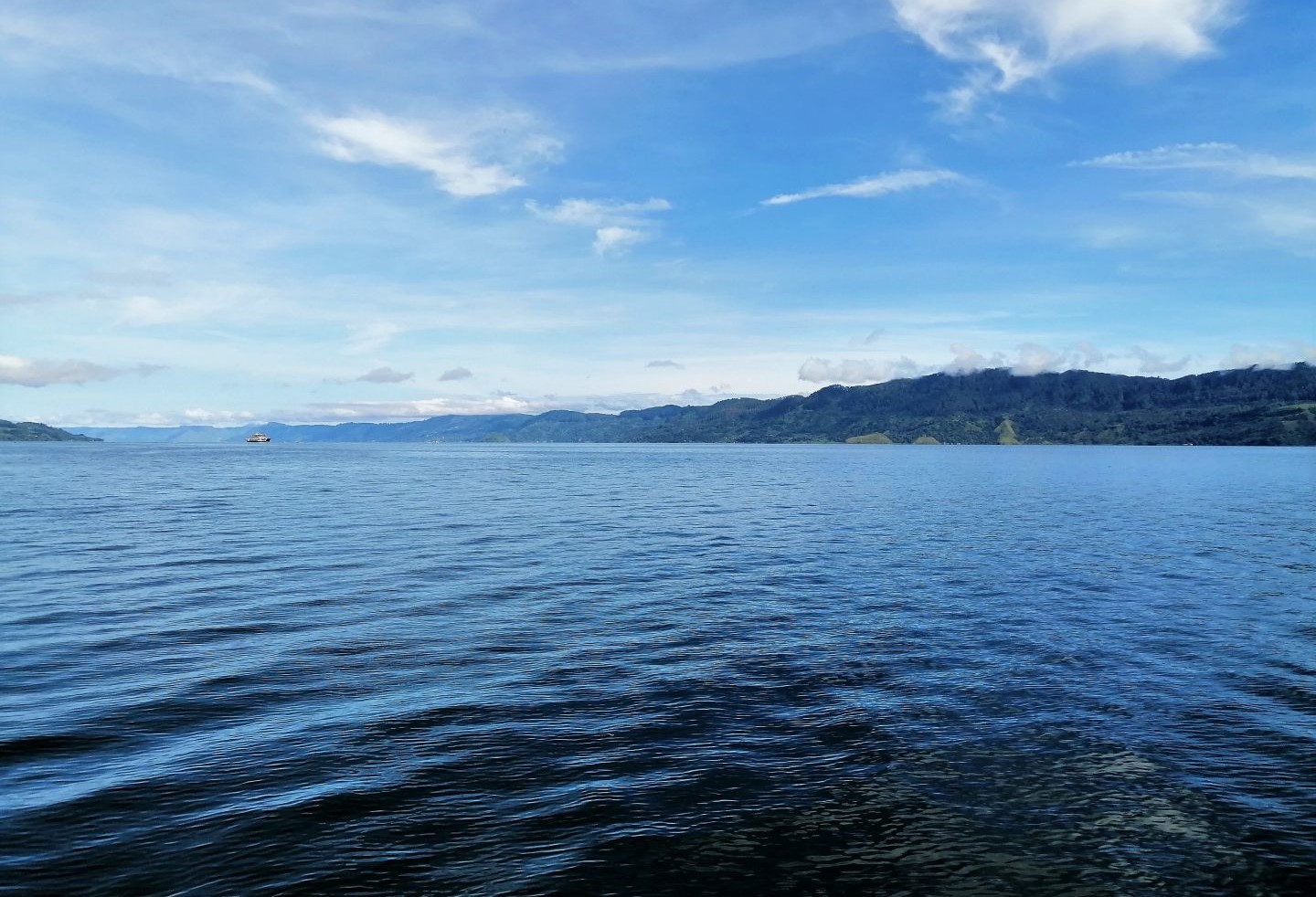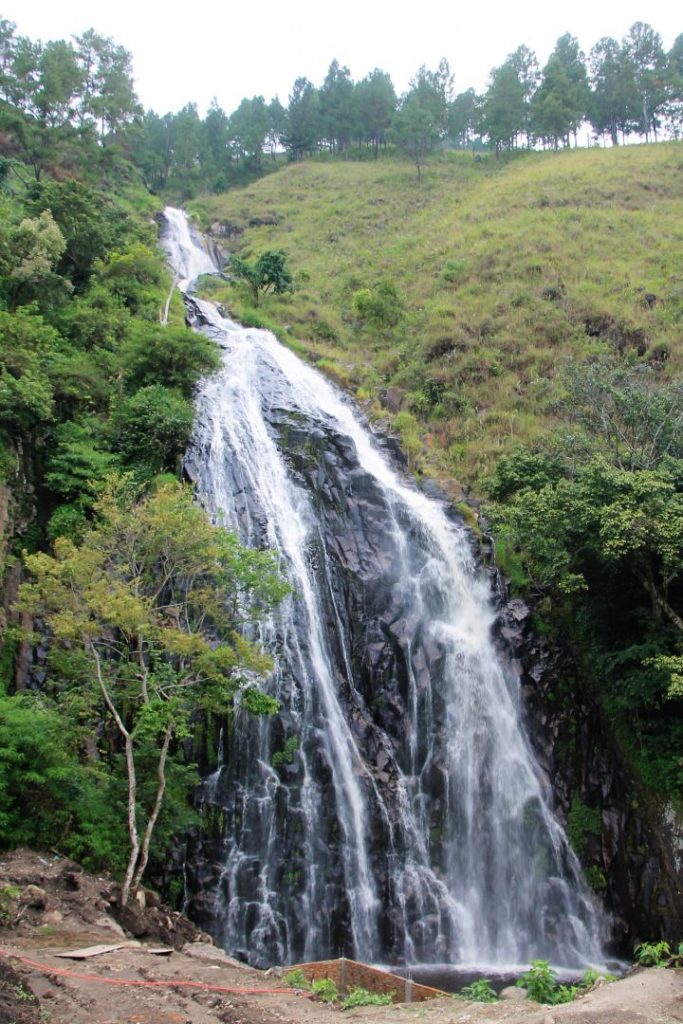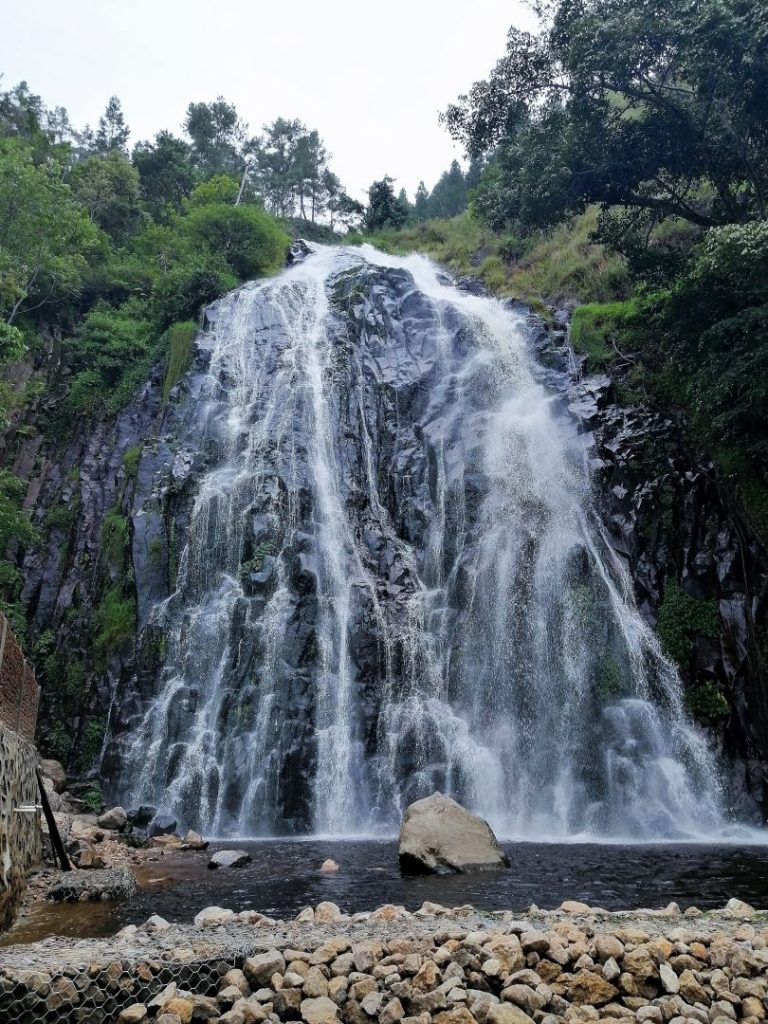Last updated on 20th March 2025
Lake Toba
The Biggest Crater Lake in the World
Lake Toba is a perfect location for magnificent panorama pictures of dense green forest, impressive mountains with picturesque waterfalls and the mirroring surface of a massive lake of fresh water that fills the gigantic crater of an ancient volcano. Lake Toba is the biggest of its kind in the world. But somehow I am taking the wet season, rain and mist, with me since Chiang Mai, Thailand, and so I had rather cloudy, even rainy days. Most pictures lack the blue sky. Like in a comedy, the best day was the day I left: crystal clear air and sunshine. But apart from that, my time at the lake was relaxing and most enjoyable. I stayed in a place called TukTuk (yes, like the infamous three-wheeler) on Samosir Island. This little village is so much nicer than Parapat on the lakes shore, it is cheaper and has better choices. It takes a 30 min ferry ride from Parapat to TukTuk. There is at least one ferry every hour.
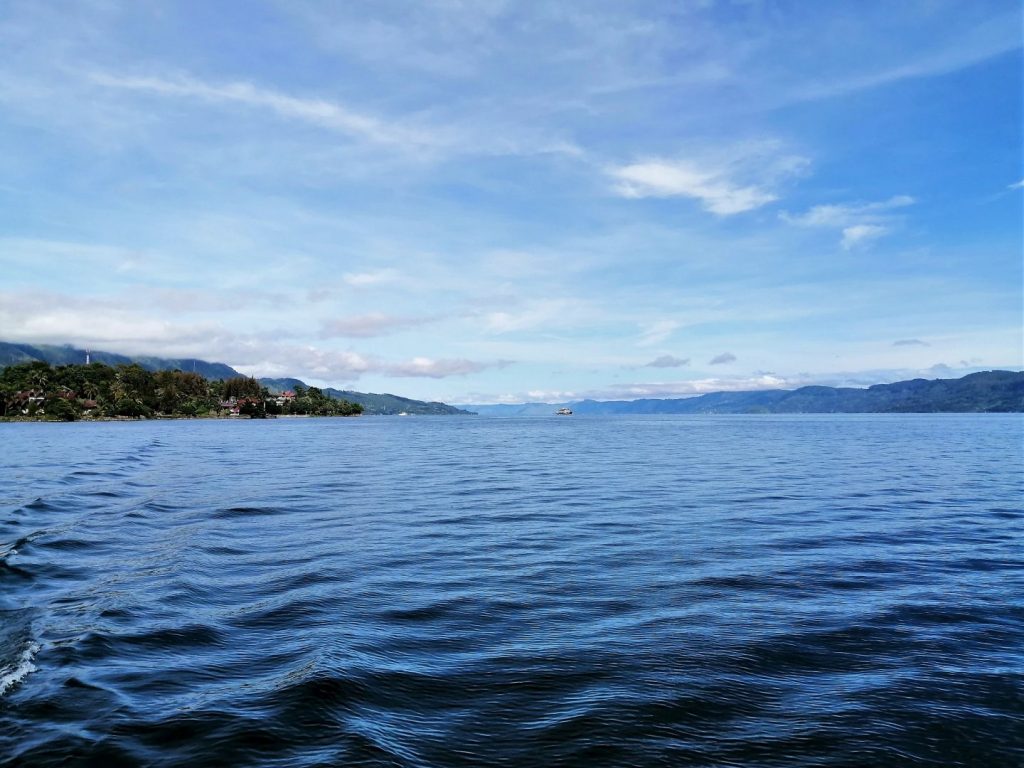
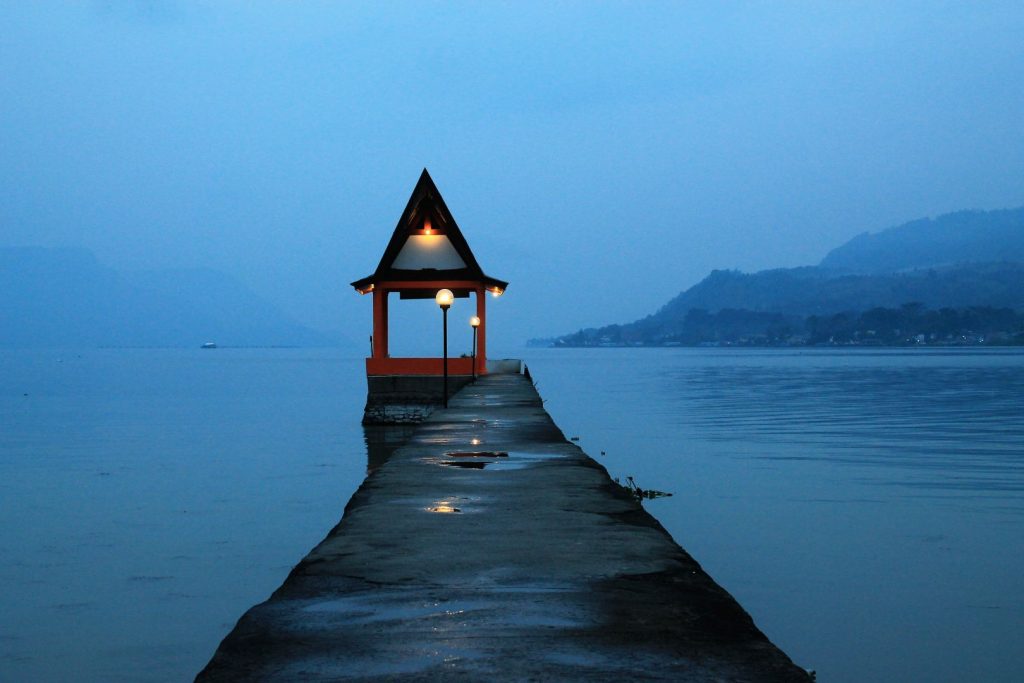
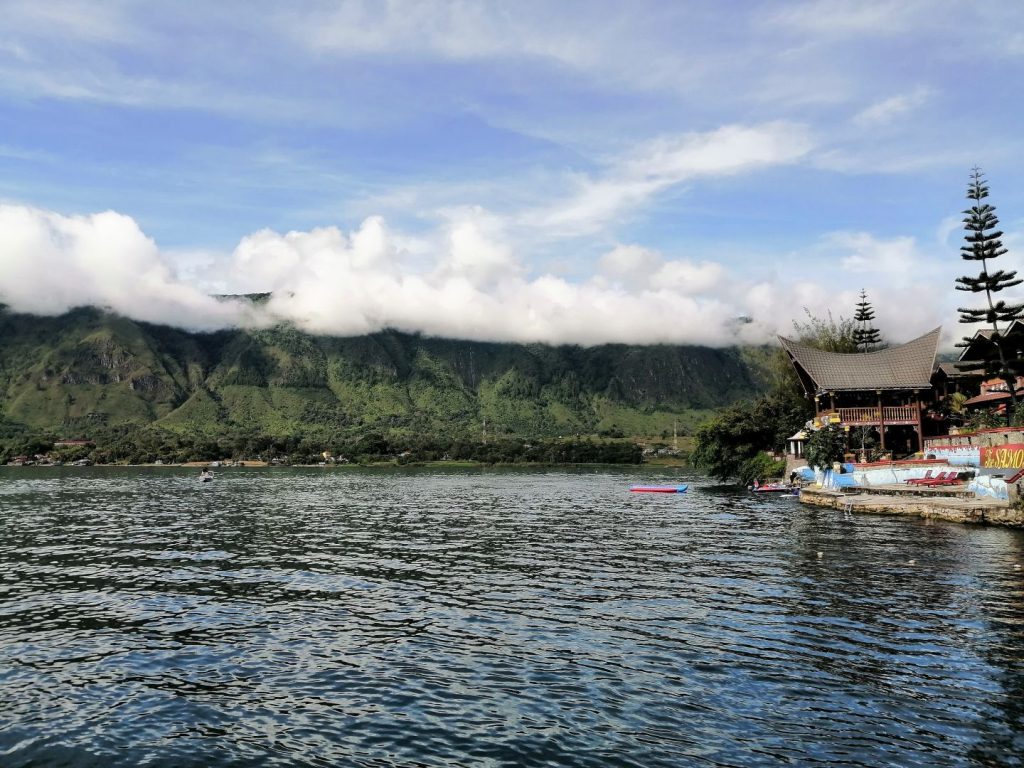
Cycling
On my first day I rented a bicycle. They are offered everywhere in Tuk Tuk. I was absolutely happy that I had found a place of such natural beauty where I could cycle once again. But my happiness did not last long, after the first hour it started to rain and did not stop before darkness fell. I had to return the bike without having gone far. I had just cycled in and around TukTuk village.
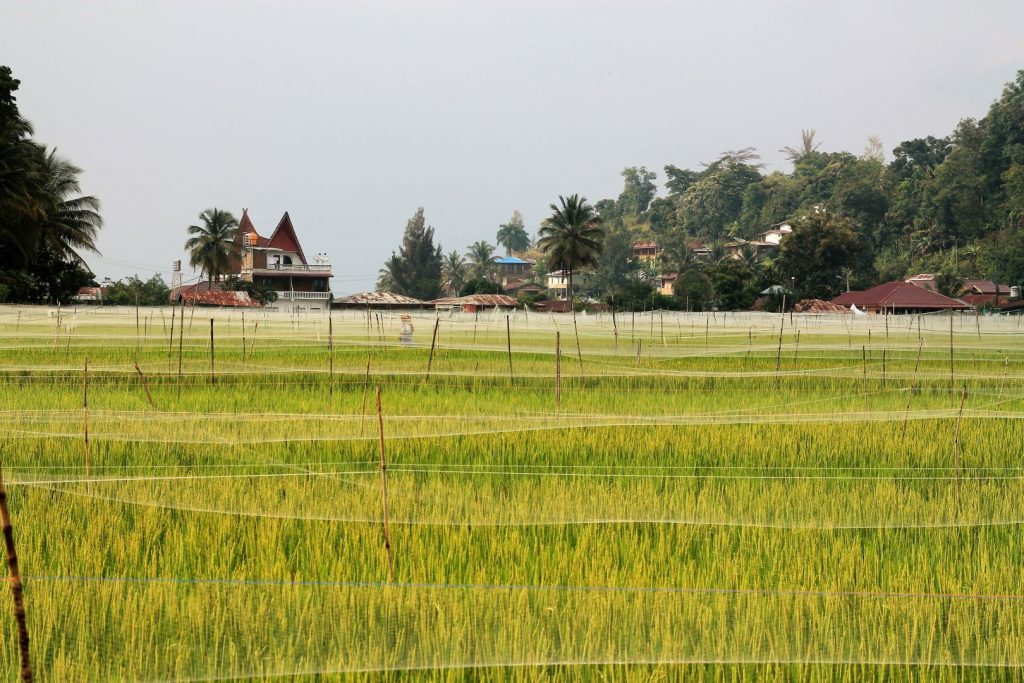
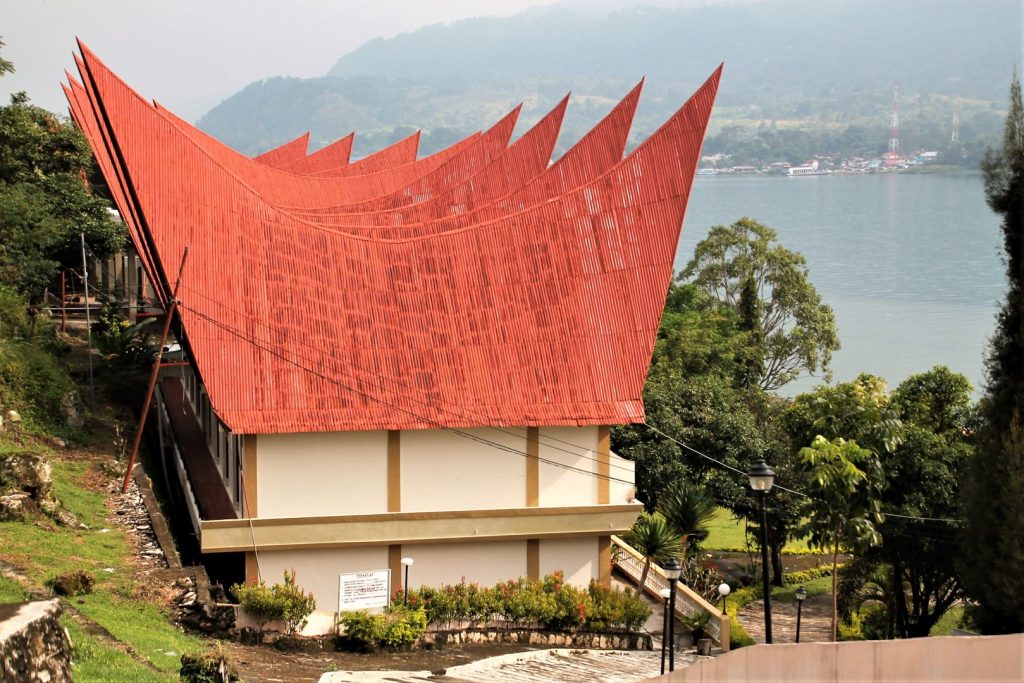
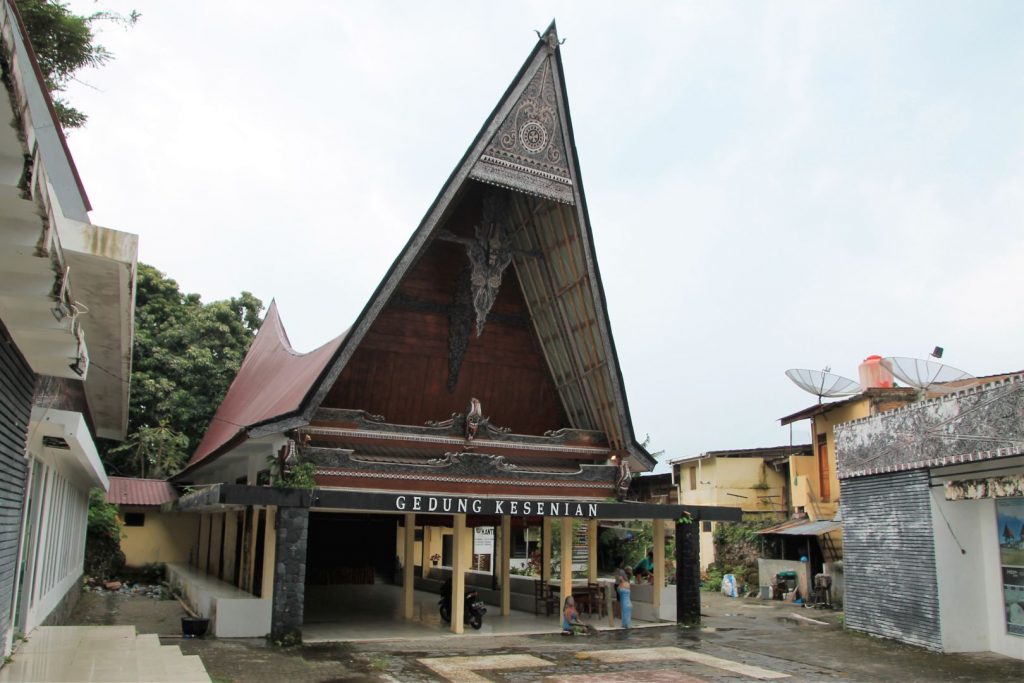
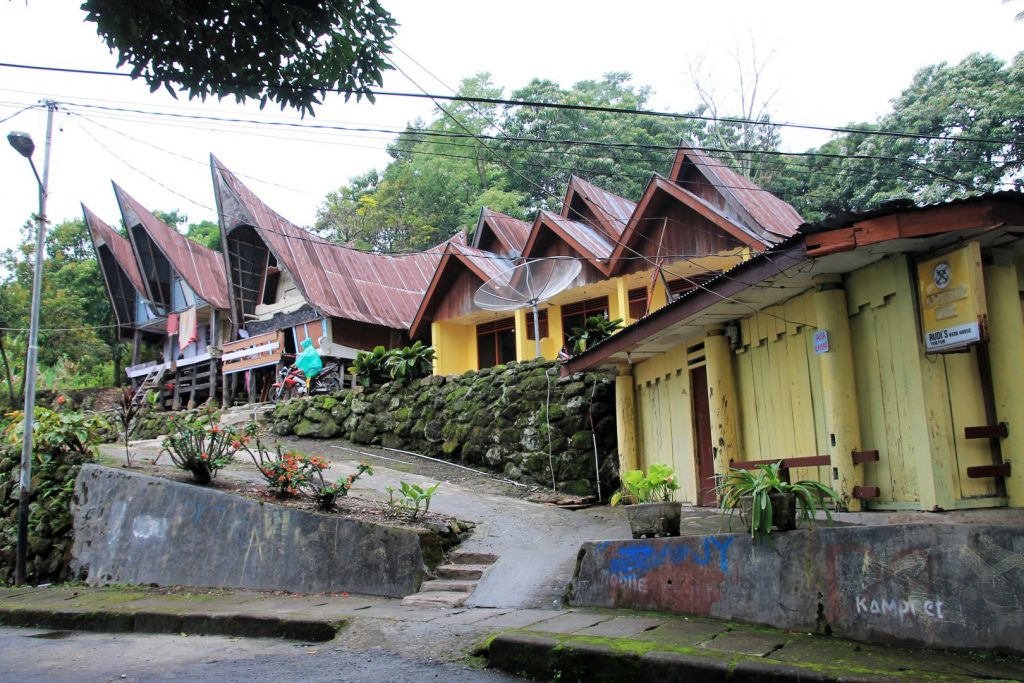
Around the Island
The weather improved the next day and there was no rain. I set off with a guide on a motorbike to go around the entire island of Samosir. I had lost my driving license (gone with the thief) and I was not brave enough to rent the bike myself. You never know what happens if the police stops me. I have experienced one day the presence of a police officer in the village. Local people were very nervous and stopped cars and motorbikes until the officer was gone. They expected that they might have to pay something, and apart from that some people driving around without having paid the taxes.
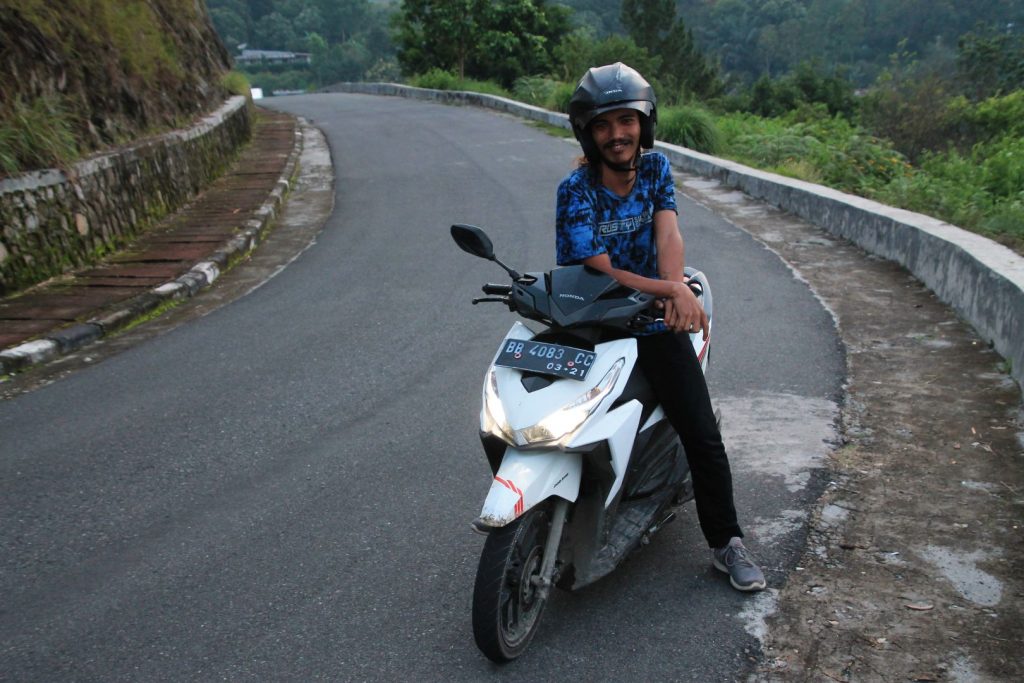
We drove up the mountains, we saw waterfalls and the “lake in the lake”: TukTuk is located on Samosir Island which is on the island of Sumatra (an “island on the island”) and the mountain lakes on Samosir Island are lakes inside Lake Toba. People find that funny.
I have visited the ancient Batak village where the people of the Batak tribe still live as they did in the past and where they have an ancient execution place with stone chairs on which the victims were tied before getting killed.
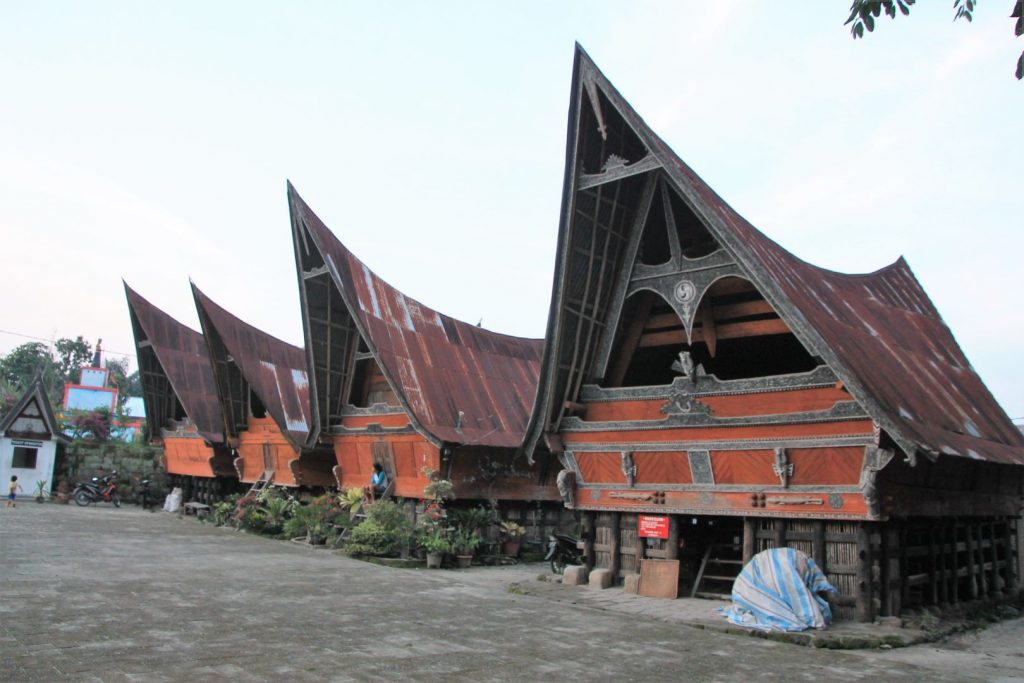
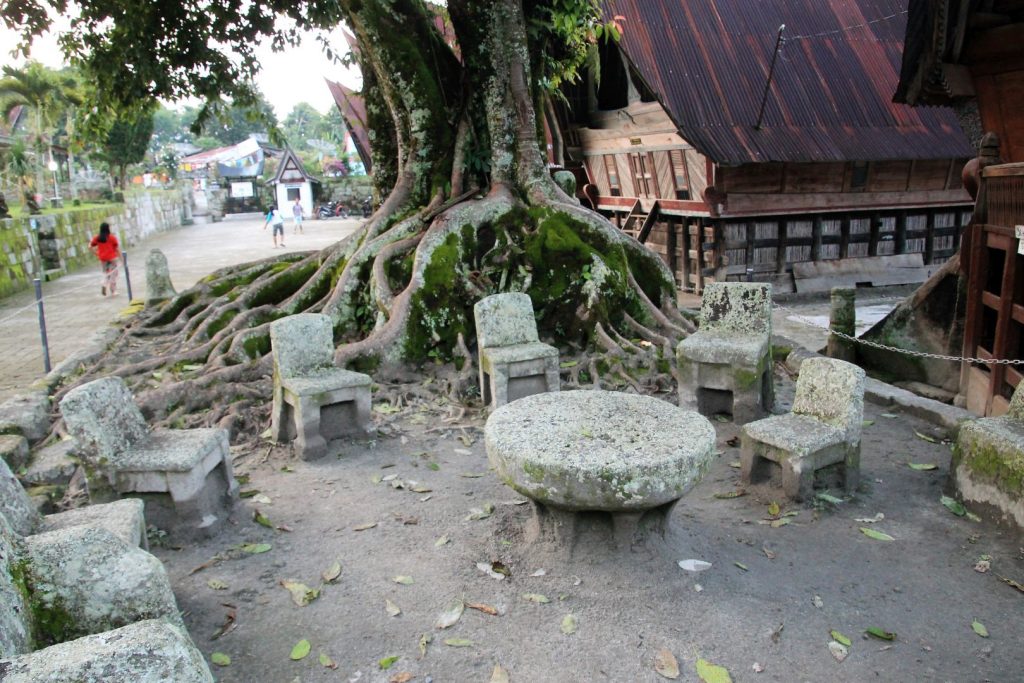
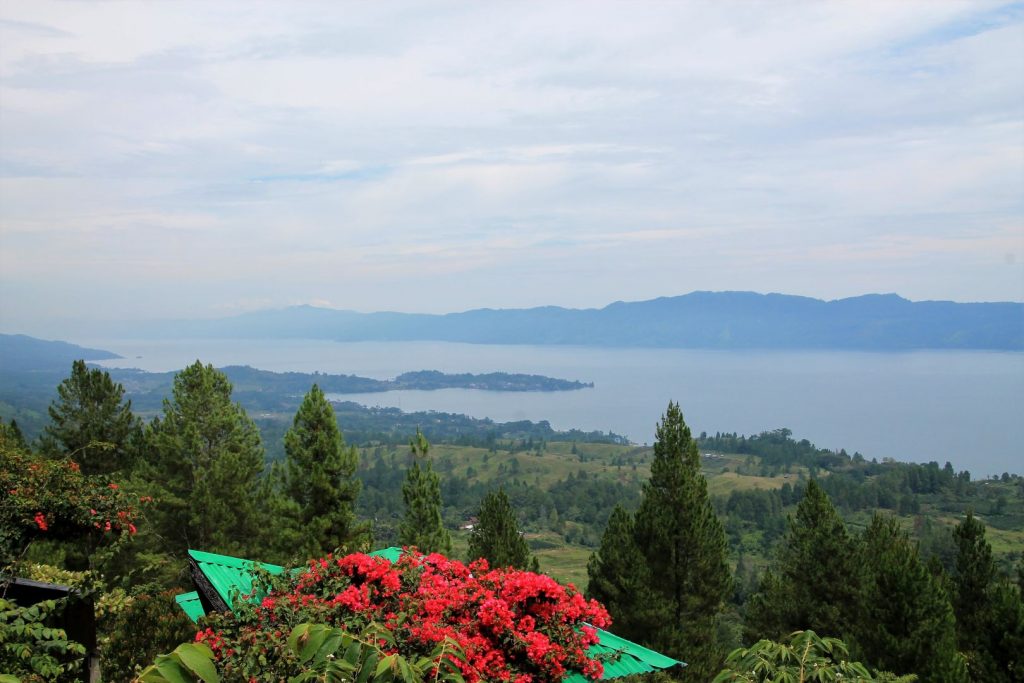
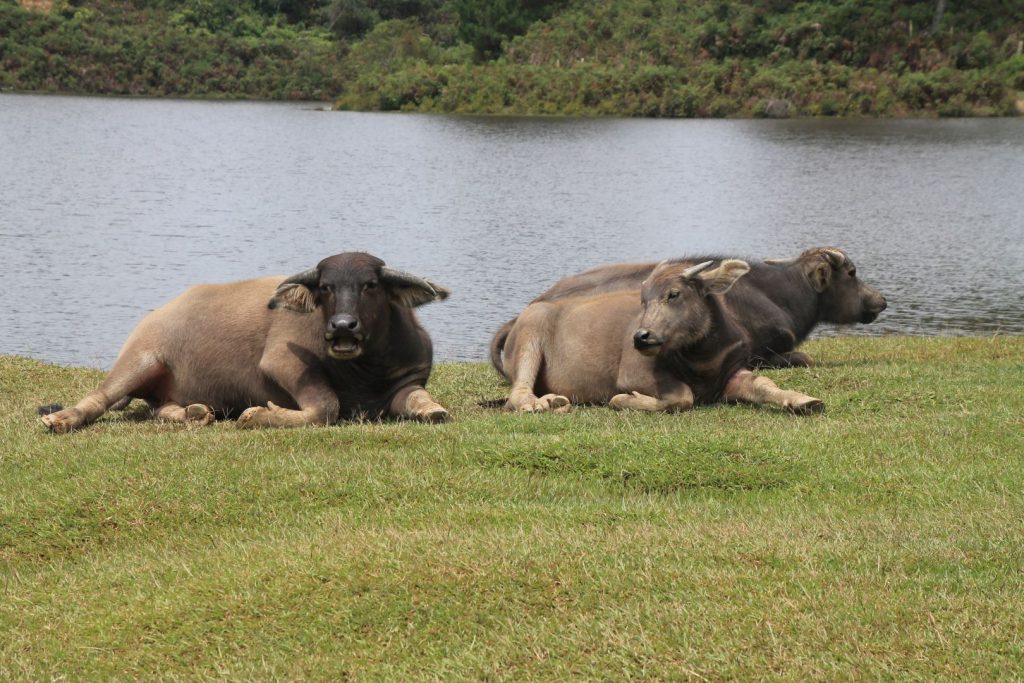
Hot Springs and Waterfall
We also drove up to the hot springs on the other side of the island. But I found the place rather disappointing. It looks like a stone quarry with one pool of sulphur water from the hot springs. Much better was our visit at the impressive Efrata Waterfall. This is a really cool, wide and high waterfall of about two or three levels coming down from the mountain. The water is brown hence it’s better not to swim here. The way to the falls leads through a little village, that not has seen many tourists, and goes along an arm of the lake that looks like a Norwegian Fjord with a stunning Panorama view. This makes this trip worth the extra 20km that it takes.
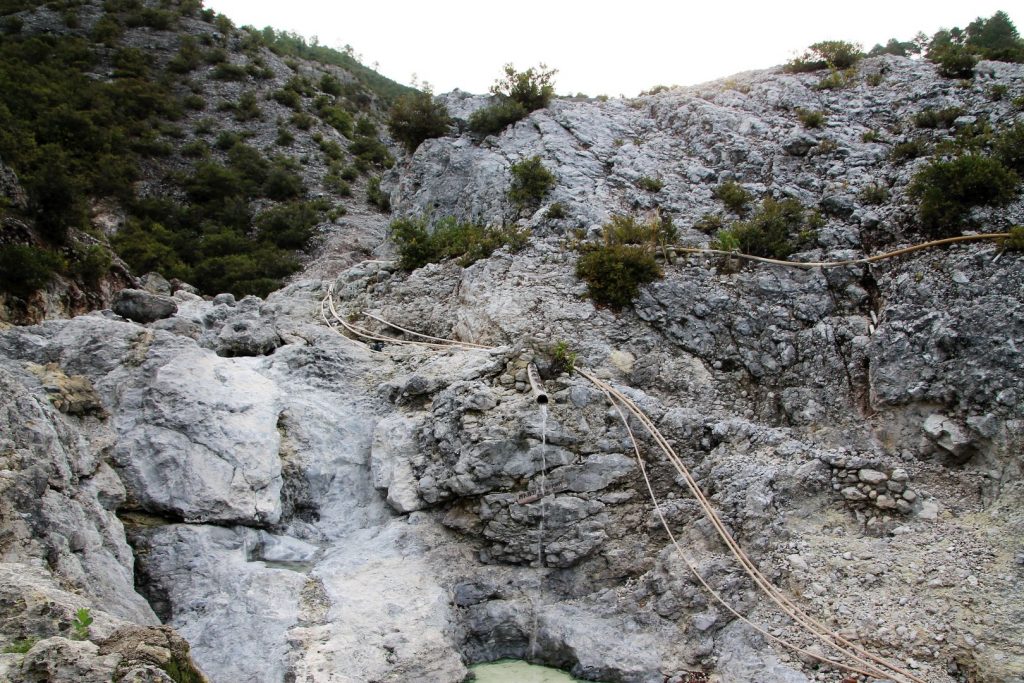
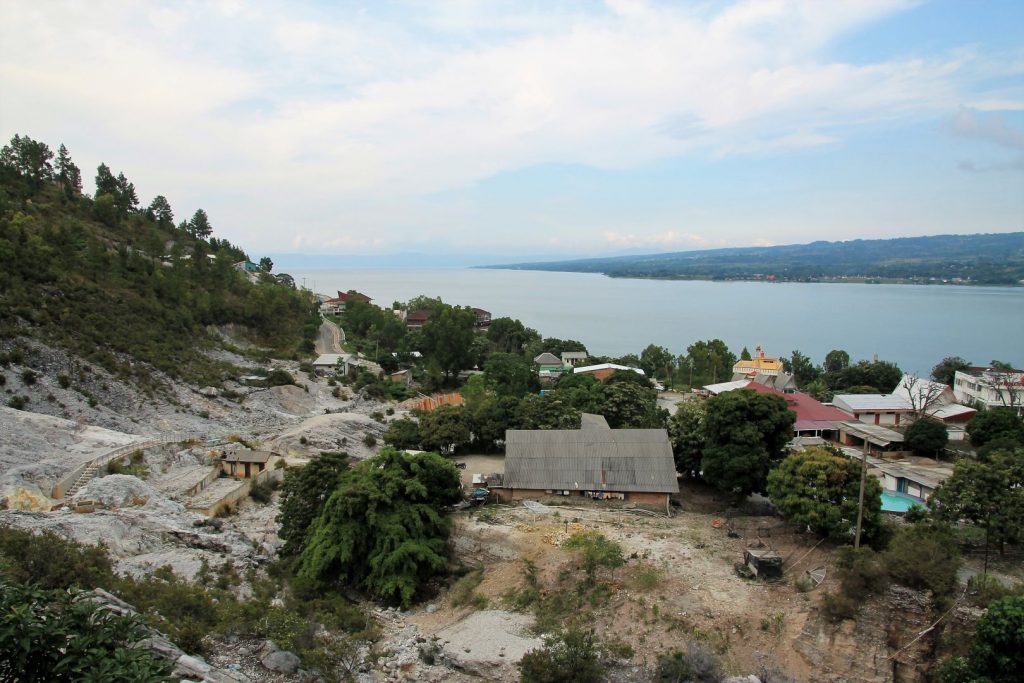
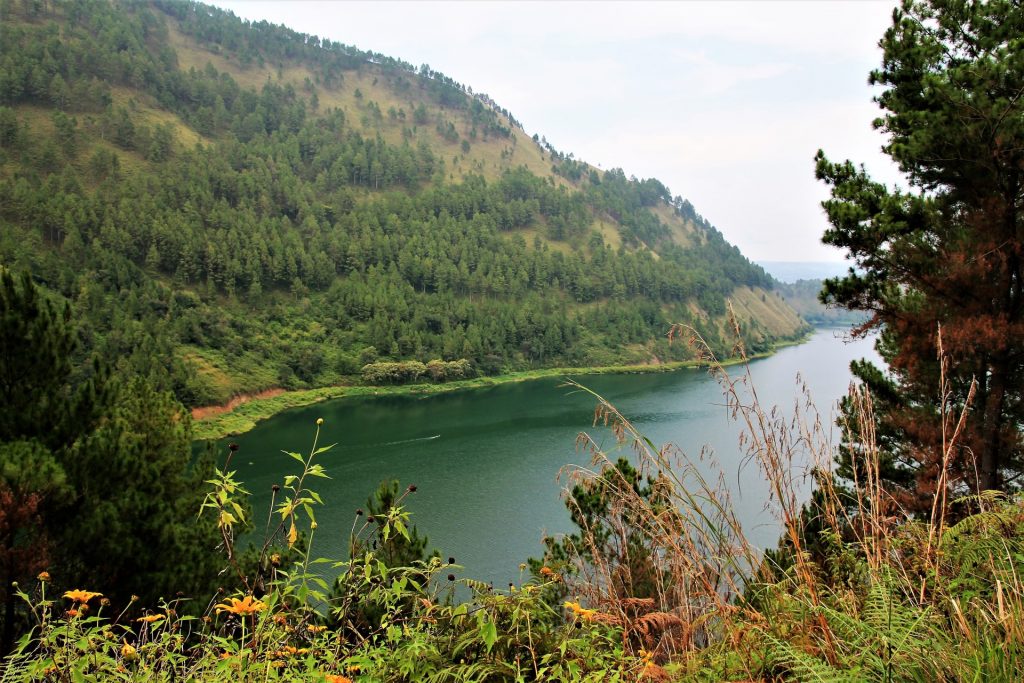
Canoeing
Lake Toba has several beaches but I found it not very appealing to go there. Instead, on the next day, I rented a canoe and paddled around. I originally wanted to circle the fish farms that are aplenty on the lake but I did not make it there. Not even to the other side where Parapat is. The lake is really, really huge. I must have underestimated distances. But once out on the waters I could enjoy the beautiful morning sunshine and the clear water, much cleaner than any beach could have been. So I took this opportunity for swimming around, and I loved it. Since Langkawi and the freshwater lake at Pregnant Maiden Island I did not have such a chance anymore.
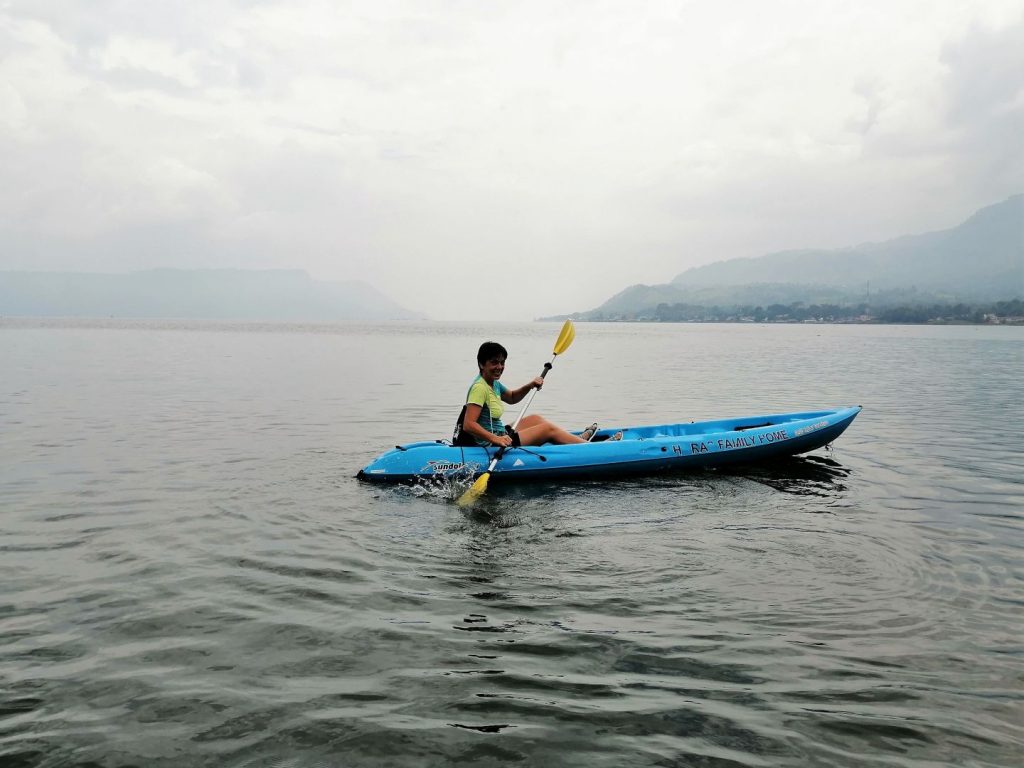
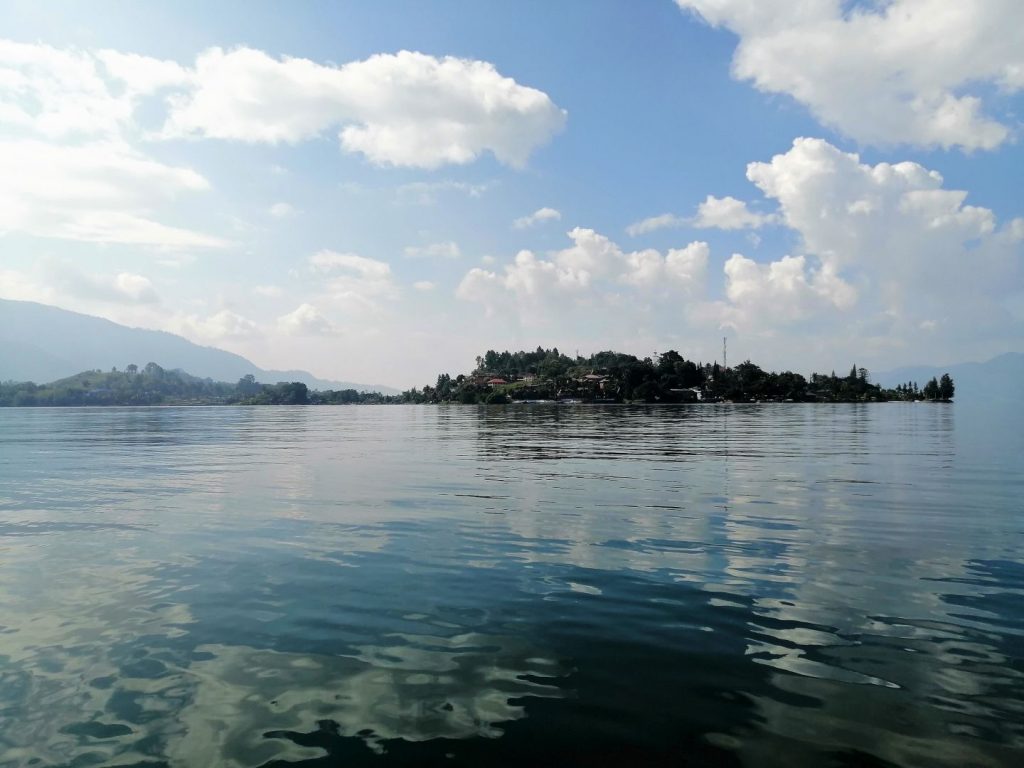
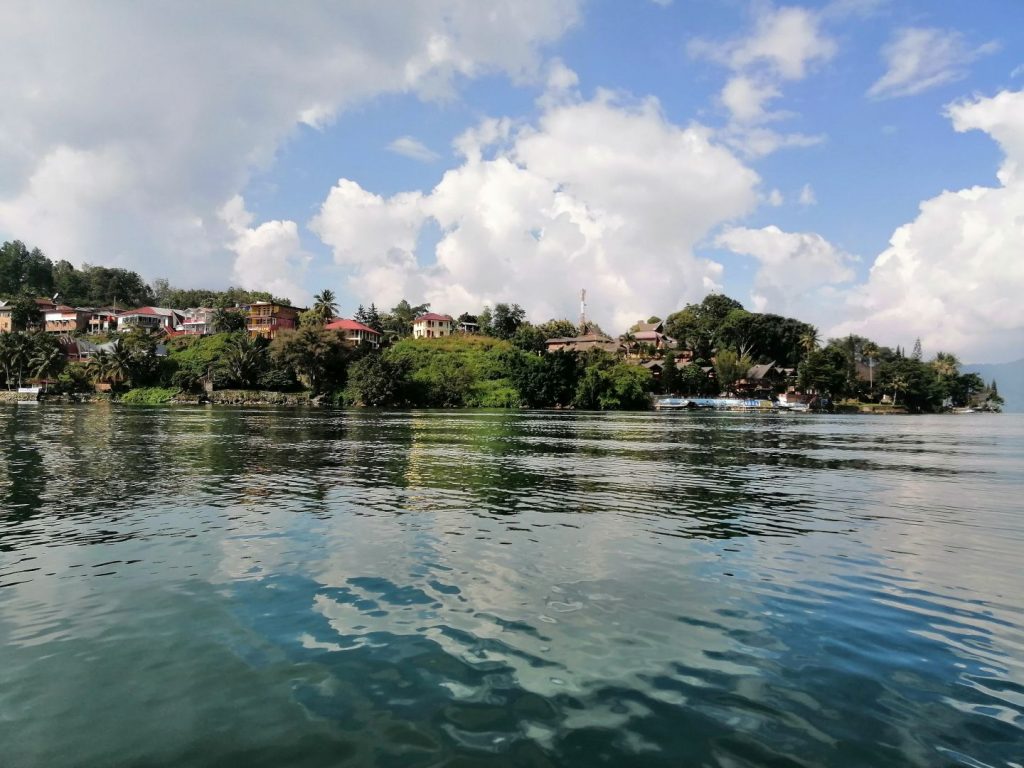
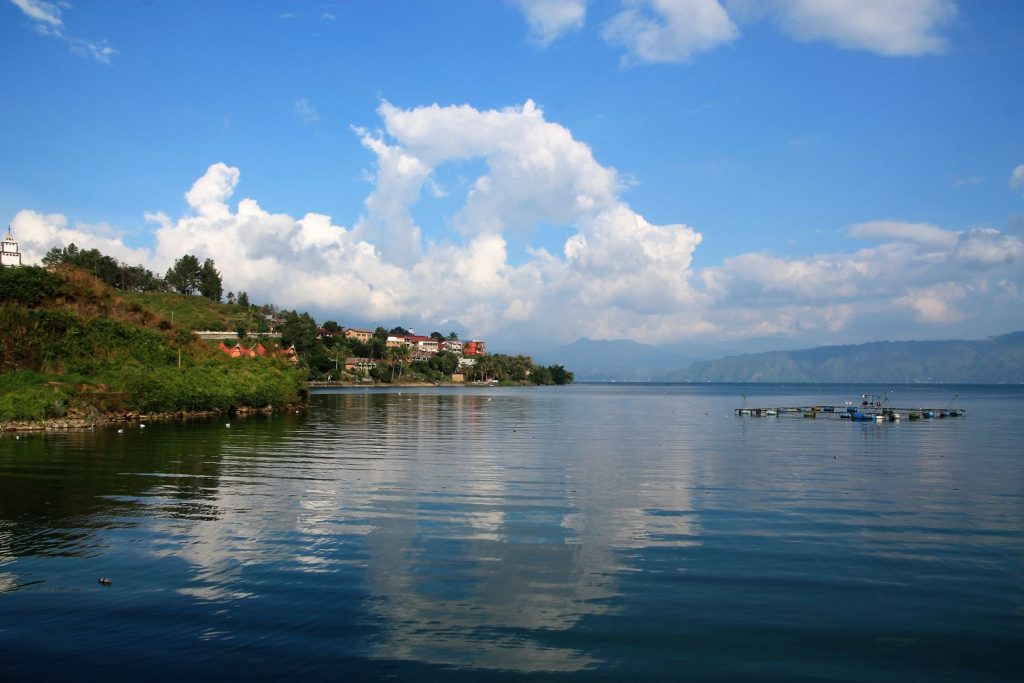
That evening was cloudy but luckily no rain so I followed an invitation to go to a village nearby where hardly any tourists go and where people still live in their traditional wooden houses, on a very basic level, without the comfort of furniture or beds. They sleep on mats and cook their meal on a stove with open fire. There is not much money around and people rely on each other’s help, still exchanging goods instead of money. Most of them work as farmers and alike.
I was invited into a house of a middle aged man who lives alone in his house because his wife left him years ago. She did not want to share the harsh living conditions anymore. In this house I had the most tasty noodle soup of all times. I tried noodle soup later many times in other places, hoping to get the same wonderful dish, but it never was cooked to this extraordinary perfection. I also was invited to something that looks like palm wine but not sweet, they say it is like beer but I believe it was sort of Tuak. It has a bitter taste, little alcohol and has a pale yellowish colour. It is one of the traditional drinks here. Funny: Only men drink this. Like with the beer. Women go for something sweeter.
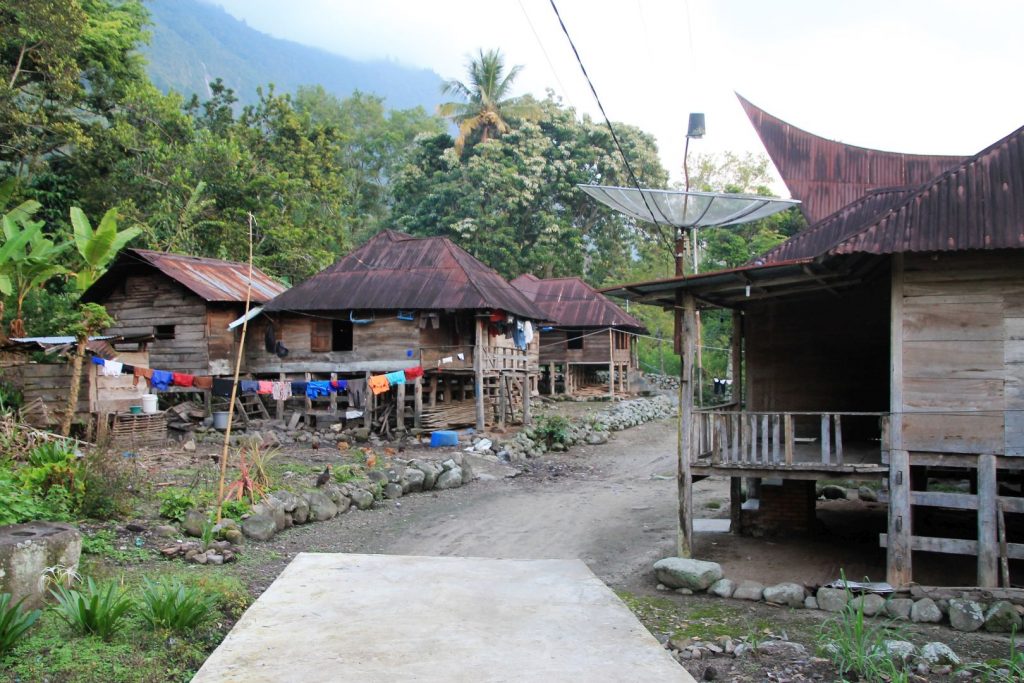
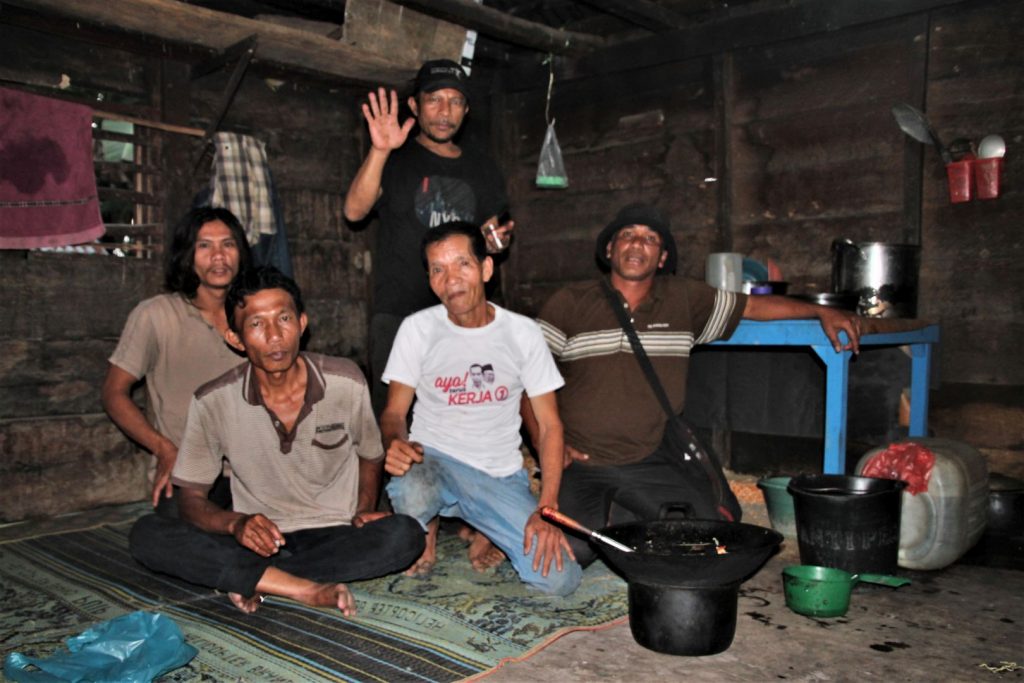
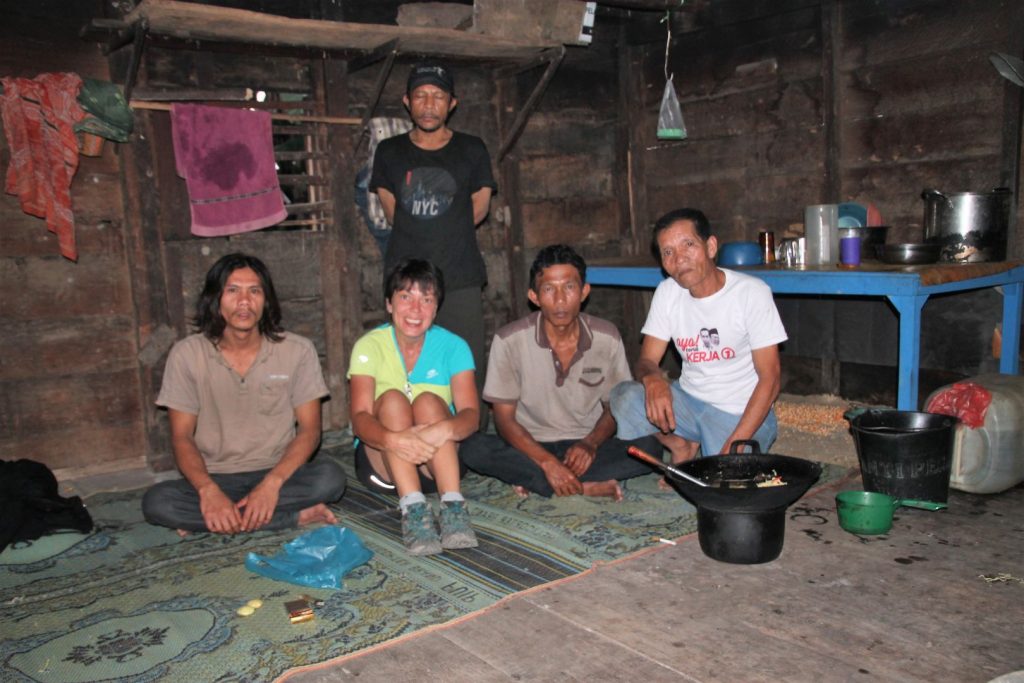
At this point I may be allowed to put a few sentences about the Indonesian money. I have seen people living with no or little money. The currency is of very little value: 100,000 Rupiah are 6.50€. That means that I am a multi-millionaire, but many Indonesians are not. One million Rupiah is the price a student has to pay to attend the university. Many people cannot afford this, hence do not study. One million is also the price Malindo Air charged me for my luggage (price per kilo – bastards!). Hence people here often cannot afford to travel by plane while we think it’s cheap. And while we are walking around with truly thick pockets full of bank notes, some Indonesians have none or very little. Think about it: having 100€ in the pocket means 1.56 Million Rupiah , and that are a lot of bank notes. Because the biggest note available is 100,000 Rupiah but usually the ATM gives 50,000 Rupiah notes. One of the villagers, Jimmy, told me that I am rich. And he meant it. I had never looked at myself from that perspective.
Sipoholon Hot Springs
As the hot springs near the Lake Toba are visually rather disappointing I booked a trip to the Sipoholon Hot Springs. It is located about 80km south of Parapat but it`s worth spending the time. Sipholon reminded me of Pamukkale in Turkey, just smaller. It is a magic place: hot water bubbles out of the earth forming pools and rivers of steaming, crystal clear water with a turquoise shimmer due to its sulphurous content. And the surrounding limestone hills dot the area with hues of orange, yellow, and green. A picturesque landscape!
Unfortunately, people here are doing the same mistake as the Turkish did by draining all the water off the terraces into the pools for people to have a bath. There used to be a big spring right in the middle of the area. It looks like a miniature volcano but no water erupts from it anymore. Once dry, the terraces turn from white to brown and get eventually washed away by the rain. There are no restrictions and people can walk (and do walk) all over the place. There are plenty of footsteps imprinted in the soft surface of the area, and a lot of plastic bottles from people who wanted to see if they would melt in the hot water.
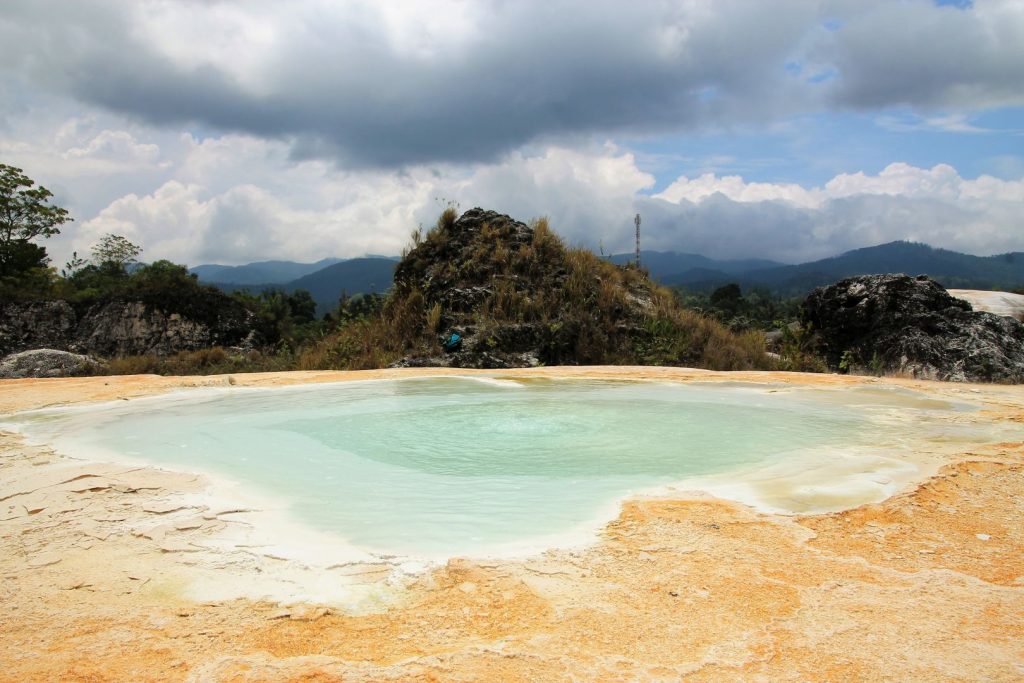
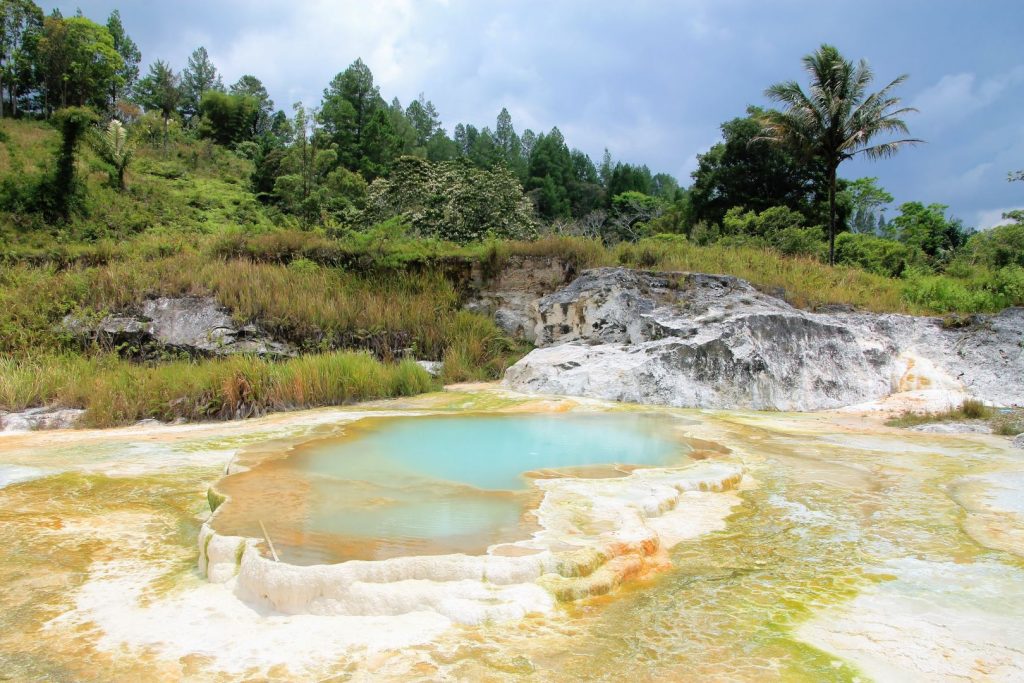
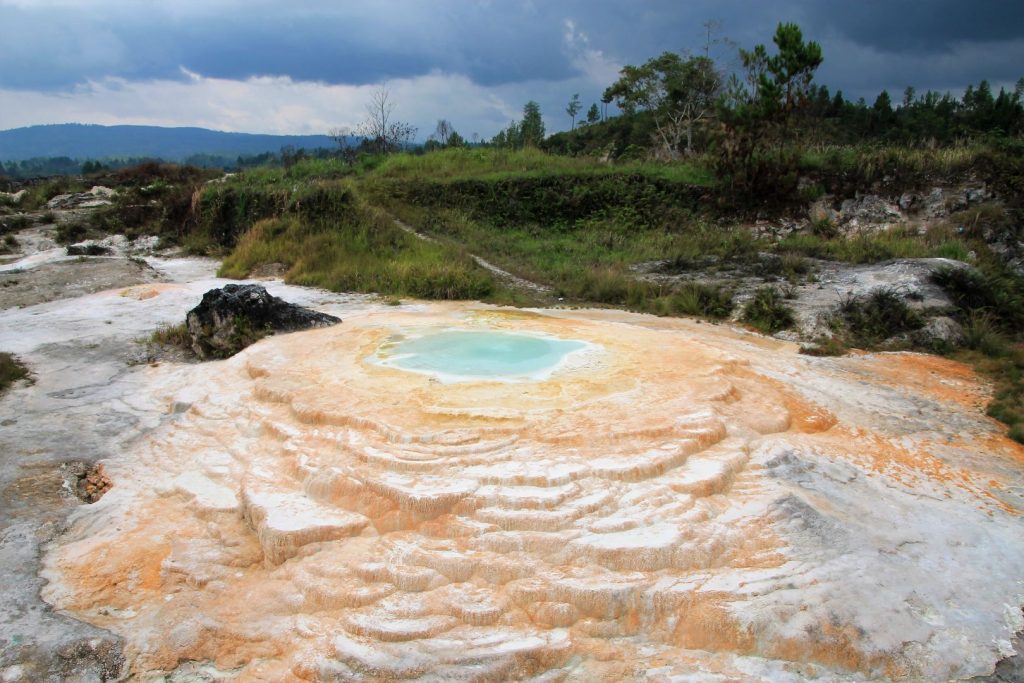
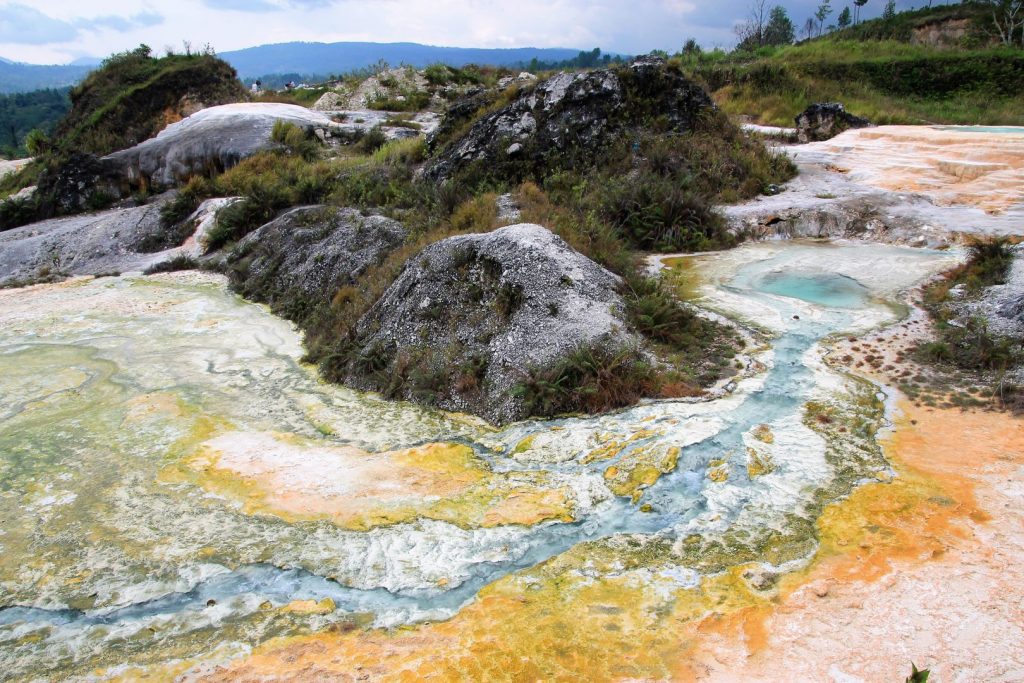
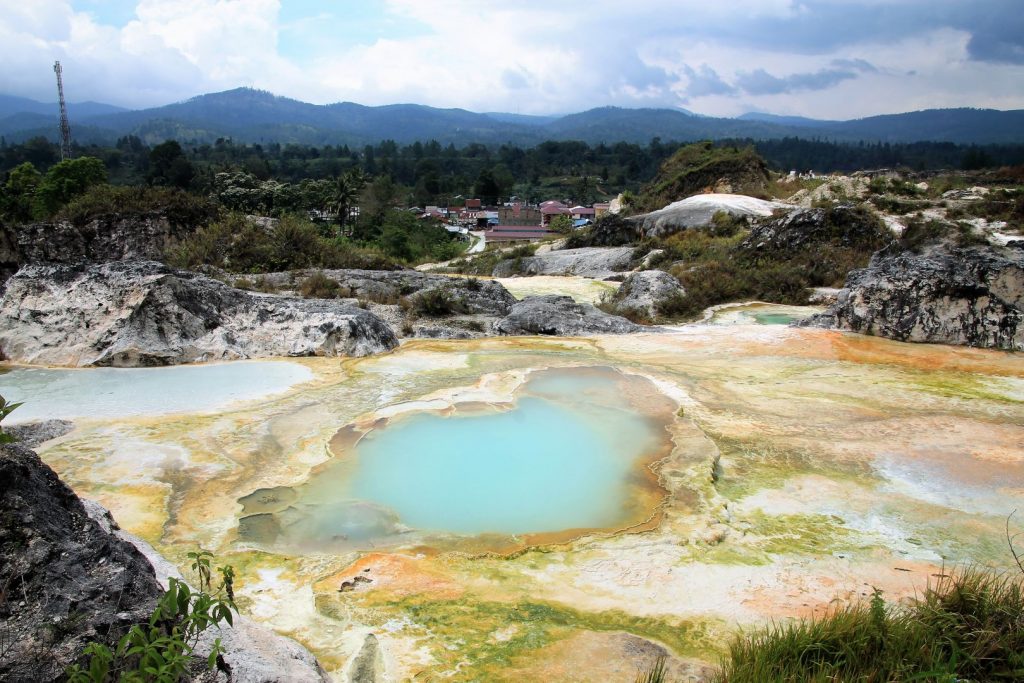
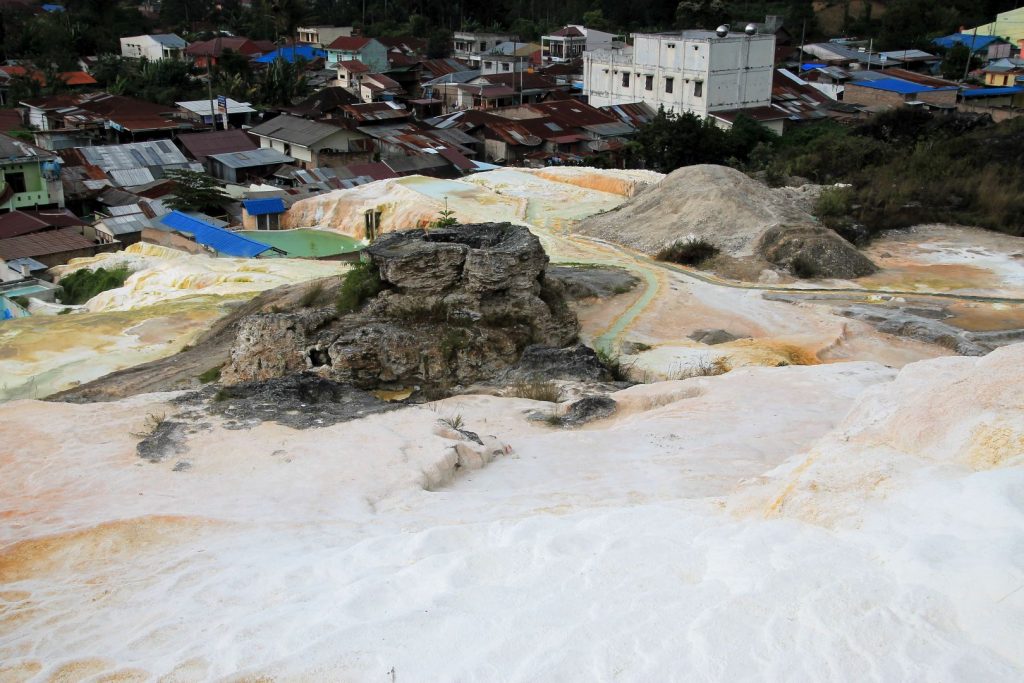
Berastagi
Small town with fantastic surroundings
No visit at Lake Toba is complete without going to Berastagi and climb the Sibayak volcano as well as dip into the wonderful Two Colours Waterfall. So I went. Unfortunately I had chosen public transport and missed the road that goes along the shores of Lake Toba and offers fantastic viewpoints. Instead I had an extra-long and bumpy ride with the locals, just because I am thick-headed and always try to do as the locals do, and save some money.
Berastagi itself is a little town on the Kao highlands built along a single main road that is always busy and mostly clocked up. I think I don’t have to mention the omnipresent problem of pollution and dirt. There are not many, if any, attractions in town, but the surroundings make up for it. I guess that is the reason for tourists to come here: jungle, waterfalls and volcanoes.
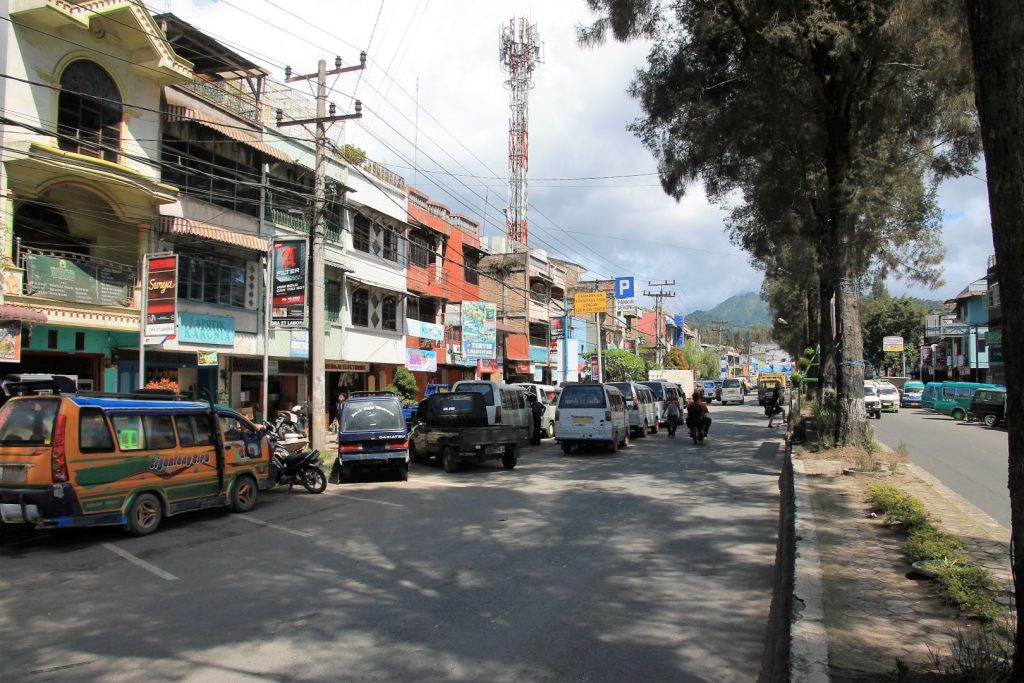
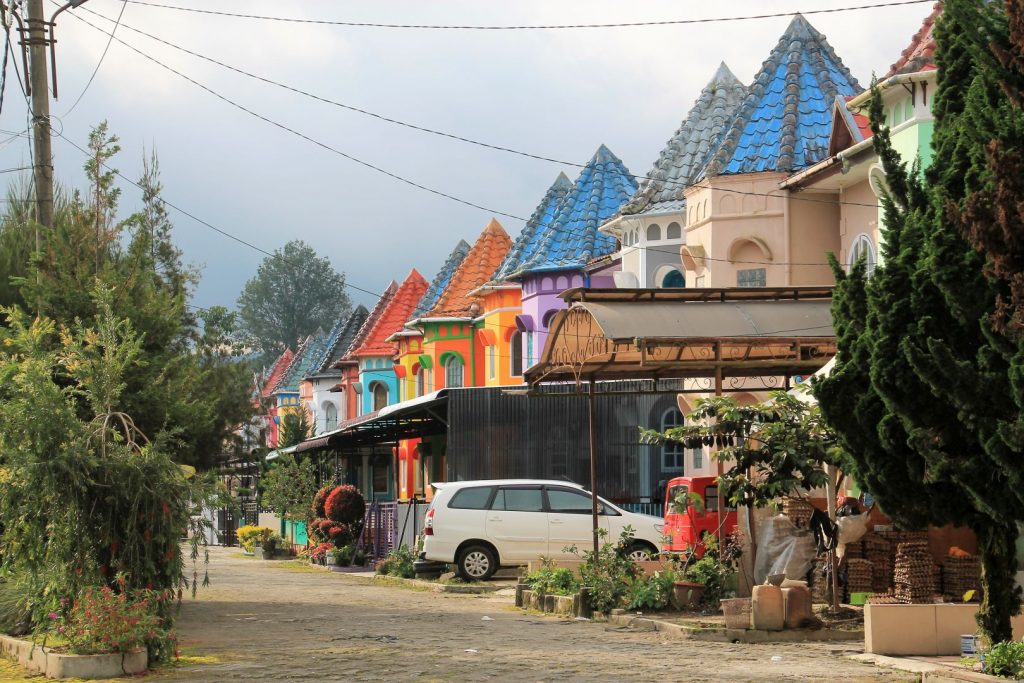
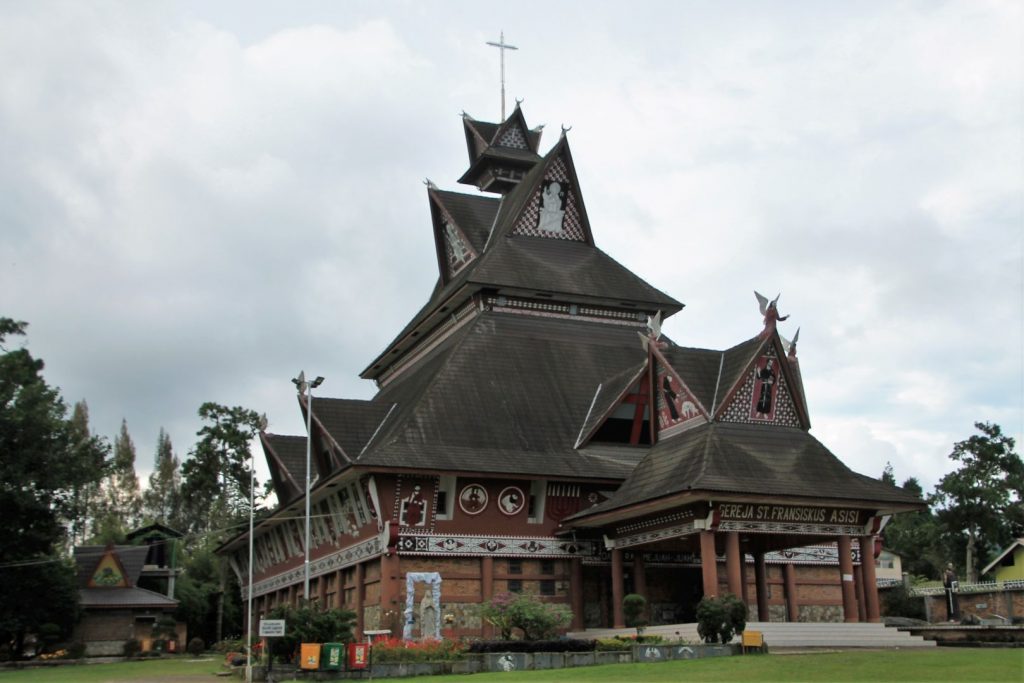
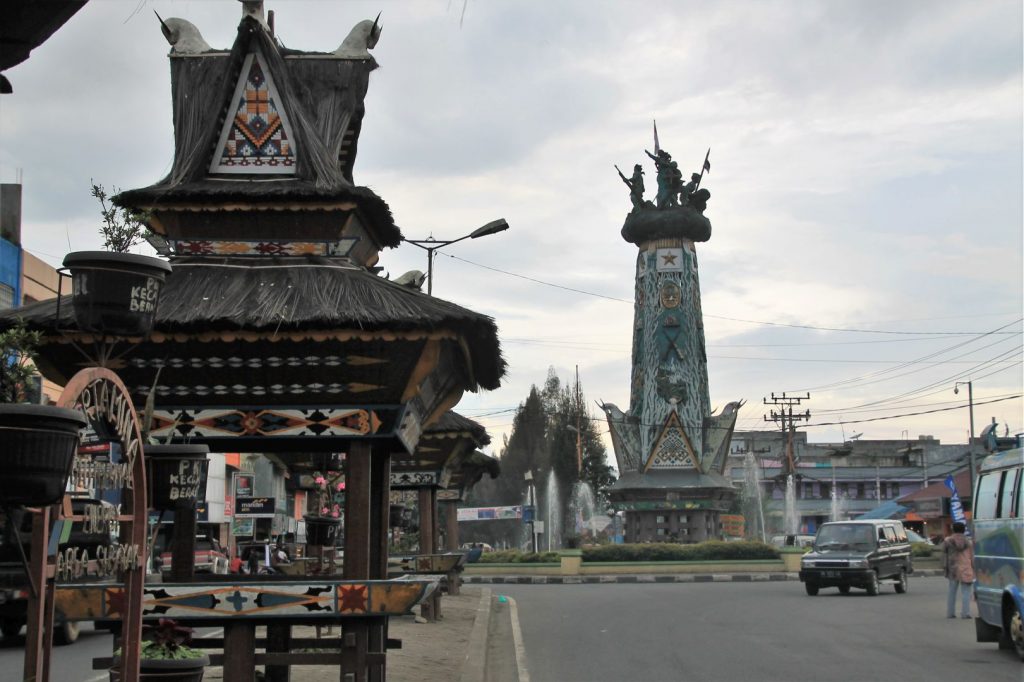
Sibayak Volcano
Not knowing the Berastagi area or the difficulties of the Sibayak hike I booked a guide to take me up the volcano for sunrise. But once again, heavy rain started during the night and at 4am it was still raining. So I had to give it a miss and started around 9:30 am instead, when the rain finally stopped. It was still misty and comparably cool. It got better every hour and finally, on our way back, the sun was out. The volcano is very easy to climb and the path can’t be missed. Hence a guide was not really needed. This only applies for hiking the same route back, which I did. For the route through the jungle down to the hot springs it might be advisable to have a guide. At the starting point there is a big (!) sign with the list of all the people who got lost during their hike on the mountain since 1983. Some of them were never found. The last on the list is Klaus Walter in 2017 who was found dead 7 days after he being lost. Here are the coordinates of the starting point of the hike: : 3°14’10.3″N 98°29’33.6″E. The blue minibuses called KAMA are part of the public transport in Berastagi and are commuting to this point.
On the day I was hiking up the volcano it was all wet and slippery from the rain during the night before. My guide helped me to overcome my fear of heights and climb up to the very last and highest top, despite all wetness. The volcano is still active and steams peacefully loads of sulphur gas. That steaming makes a lot of noise, it stinks and leaves yellow sulphur around the exit holes. The crater itself is filled with rain water. A very beautiful view.
I will never forget two moments of the climb: The first one when I reached the edge of the crater and the view opens into the crater and down to the lake. Amazing. And the second moment came after hiking along the crater rim that leads further up to the left. After climbing up a second time another stunning view opens over the rim of the crater onto the surrounding area down below: the jungle, the city of Berastagi and the hot springs, accompanied by a nice breeze. It takes your breath away! At that very spot a group of material arts students were practising – they could not have chosen better.
Luckily the weather was good enough by now to enjoy the stunning view. In the distance I could see Mount Sinabung steaming, one of the most active volcanos on earth. It is strictly closed for climbing due to its continuing eruptions roughly every year. My guide, whose name btw was Riskey, grew up in a village nearby that was destroyed by the big eruption in 2010. It was evacuated and is deserted today. I believe that is the Ghost Village that became a tourist attraction. Riskey told me that sometimes he goes to that village, just to see the place again where he spent all his childhood. We finished our day with a dip in the pools of the hot spring nearby the volcano. The sulphur rich water is supposed to be good for the skin. But I could not stay for too long in those pools, even the lowest temperature was still too warm for me. I rather needed a cool refreshment than a bathtub.
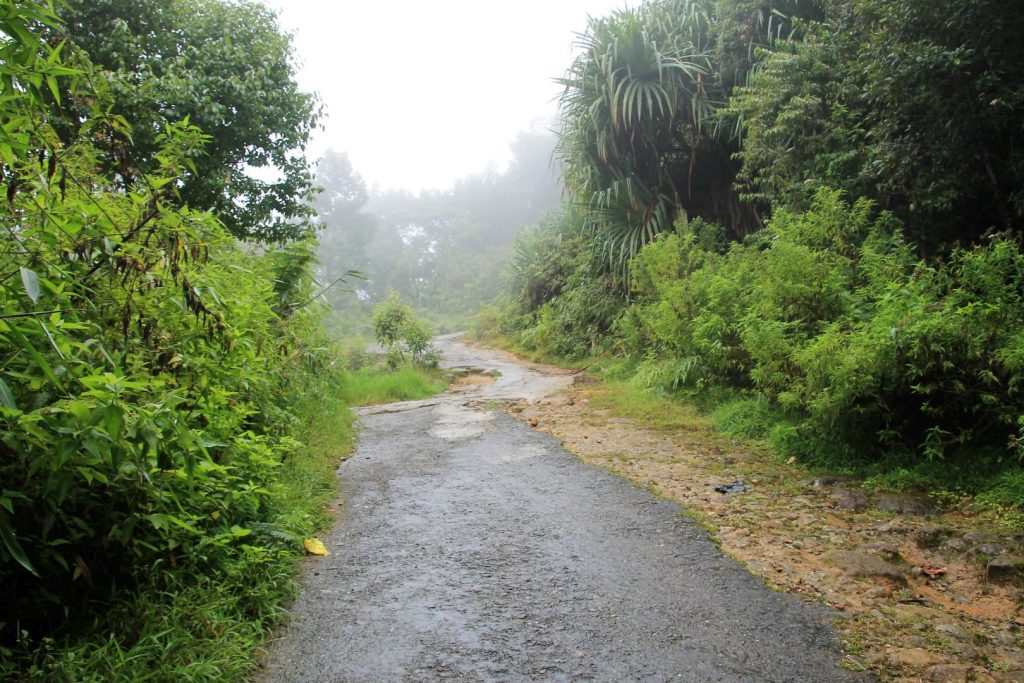
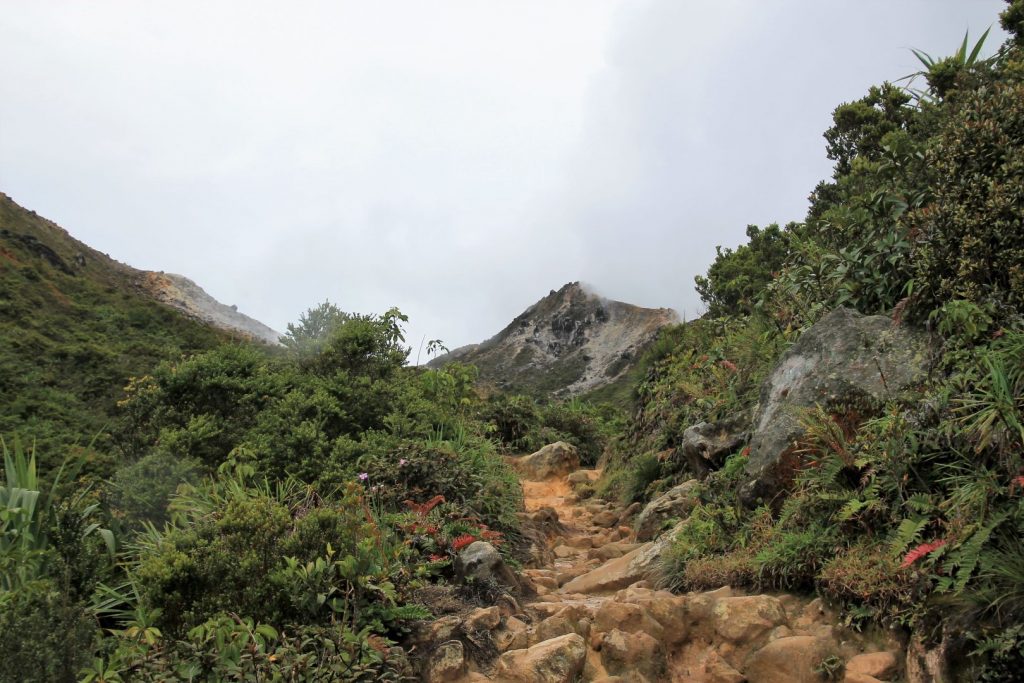
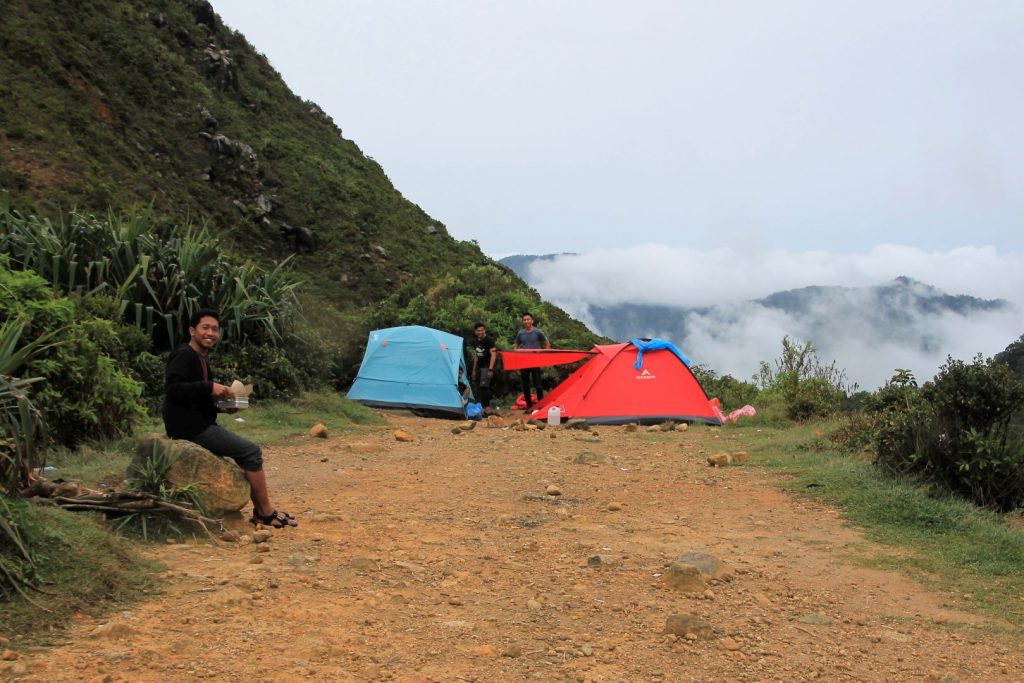
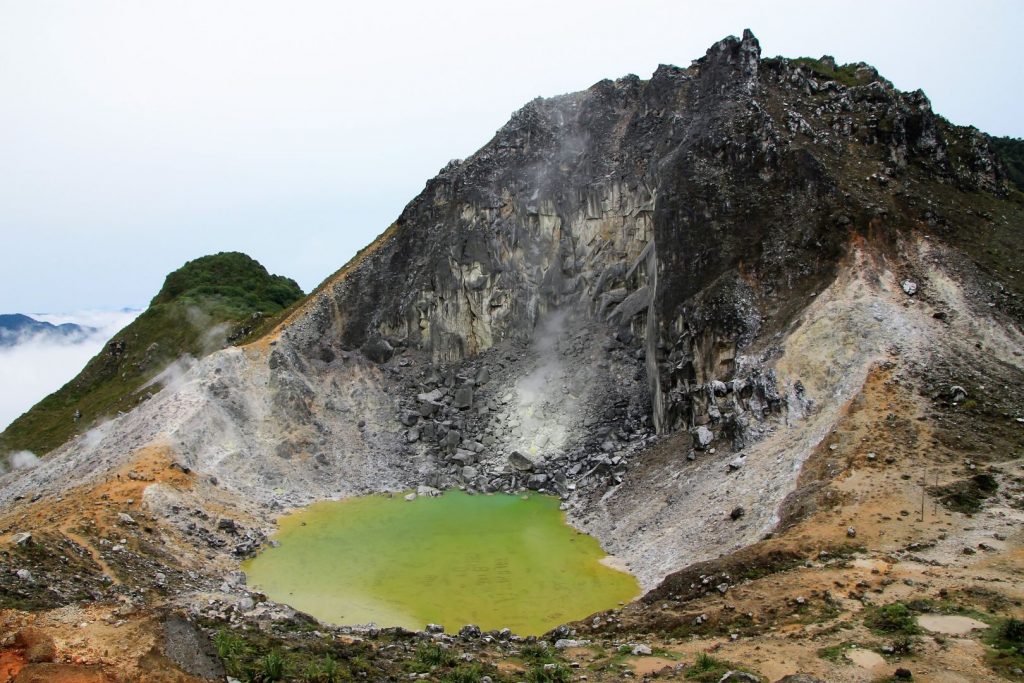
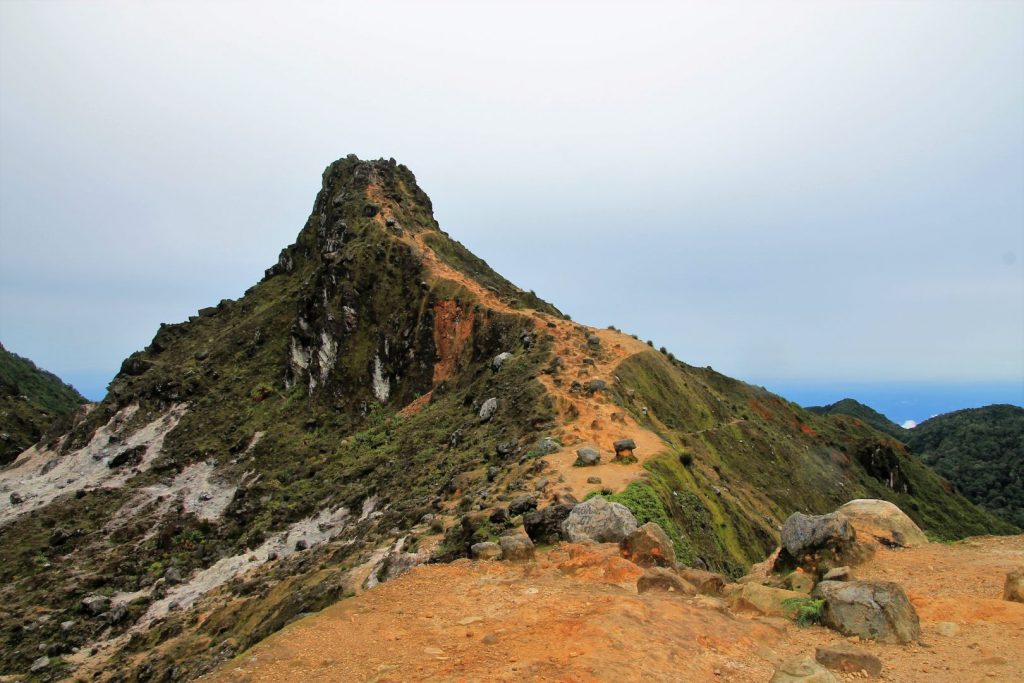
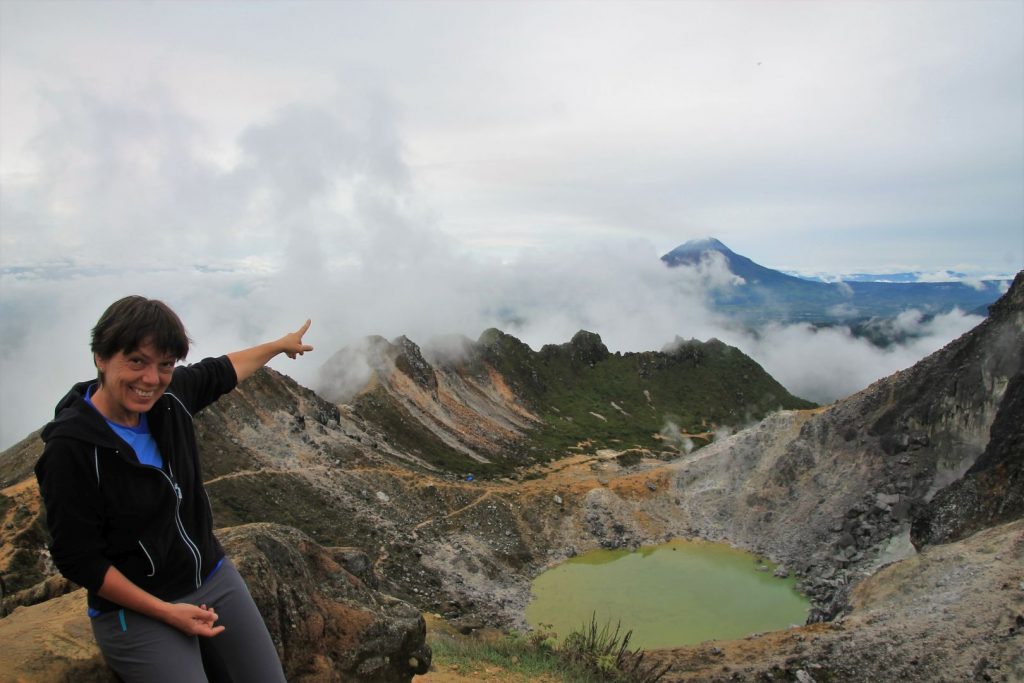
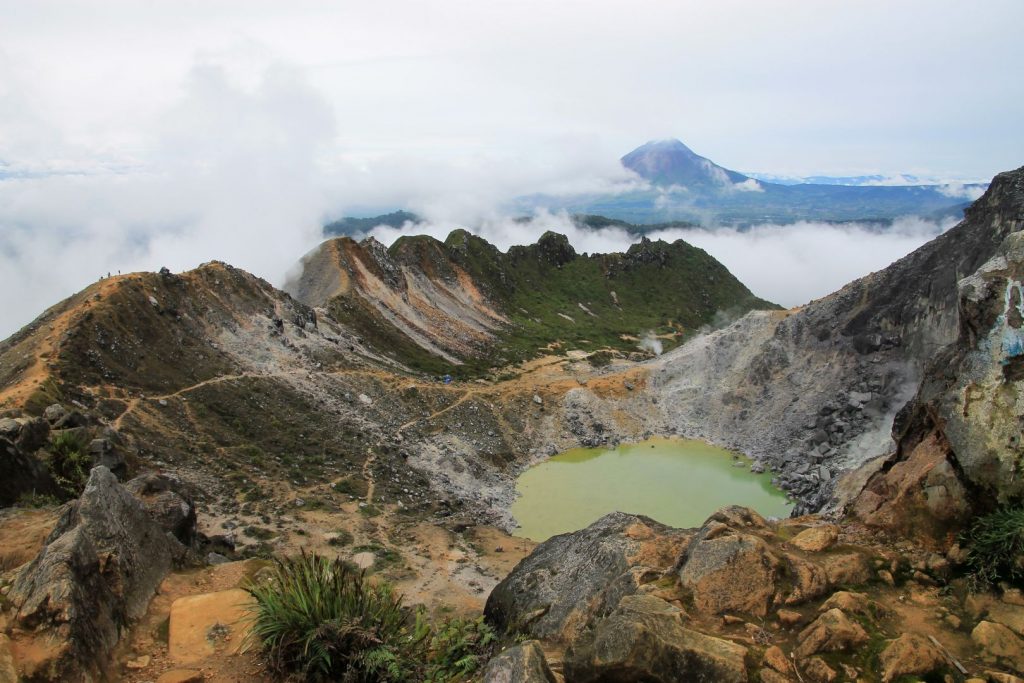
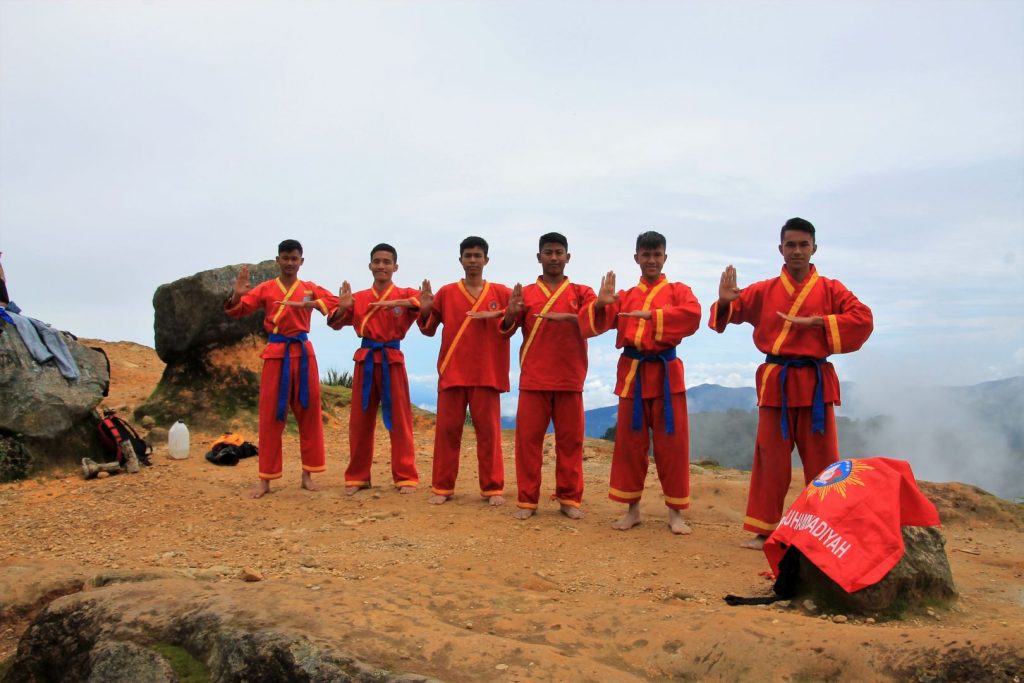
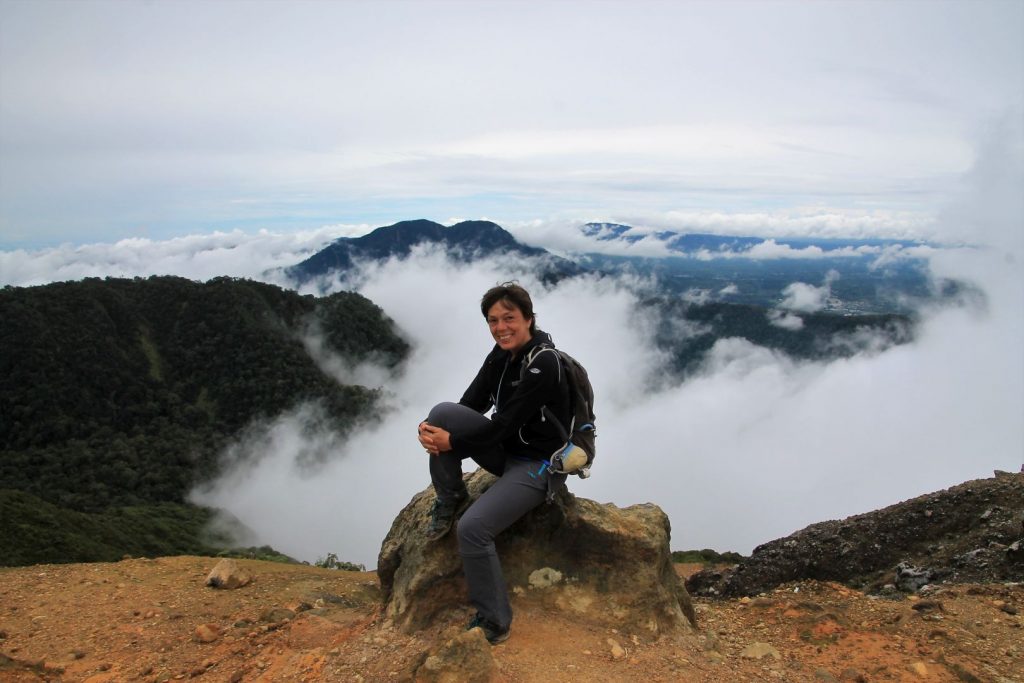
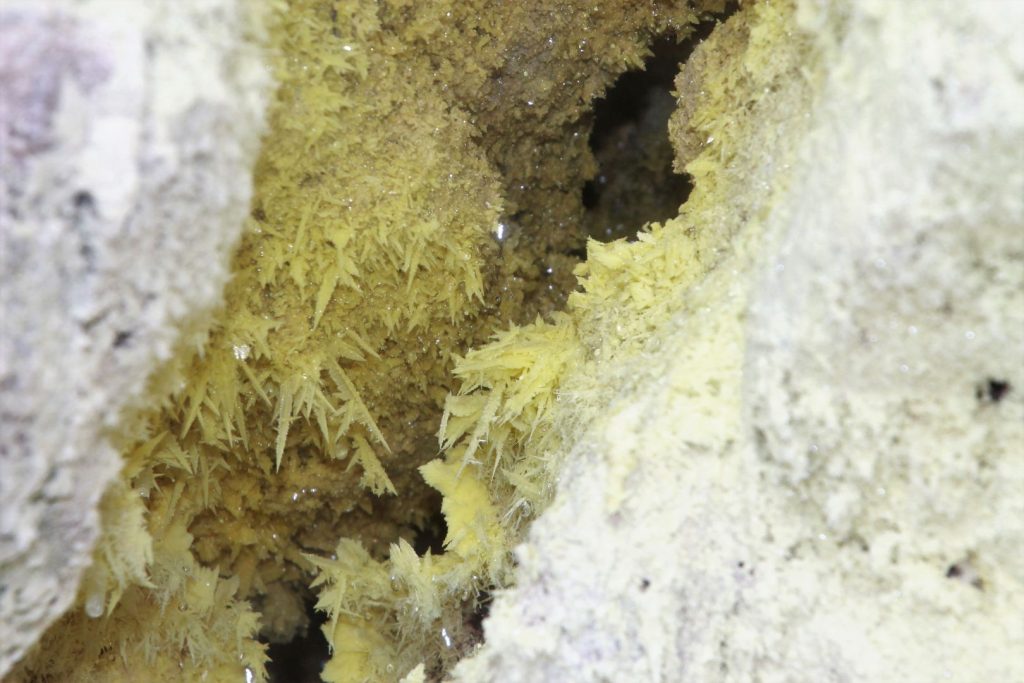
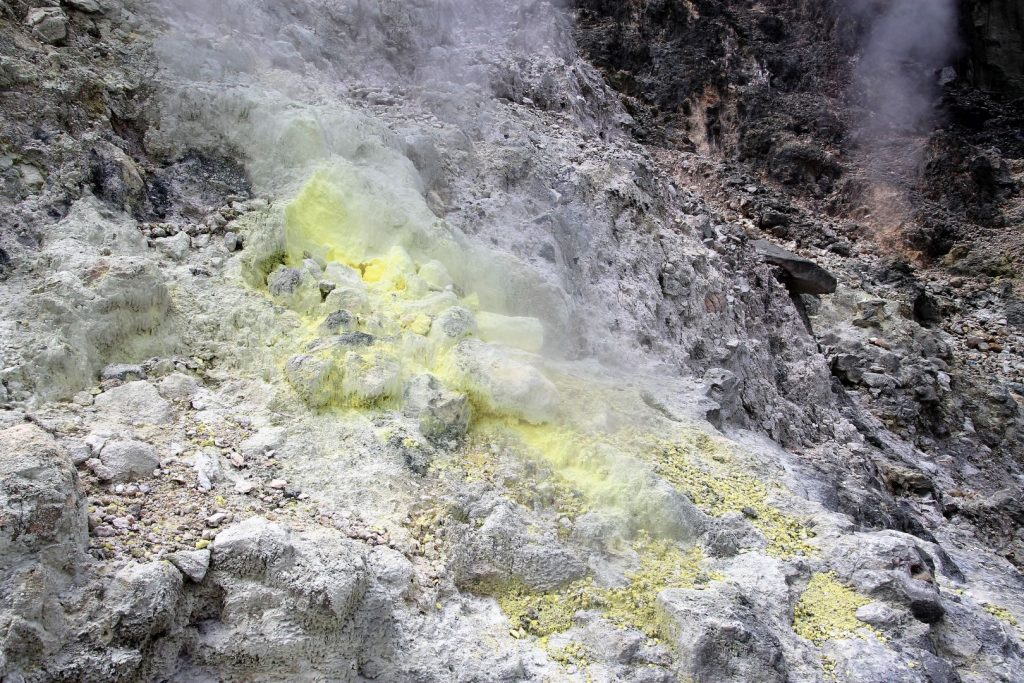
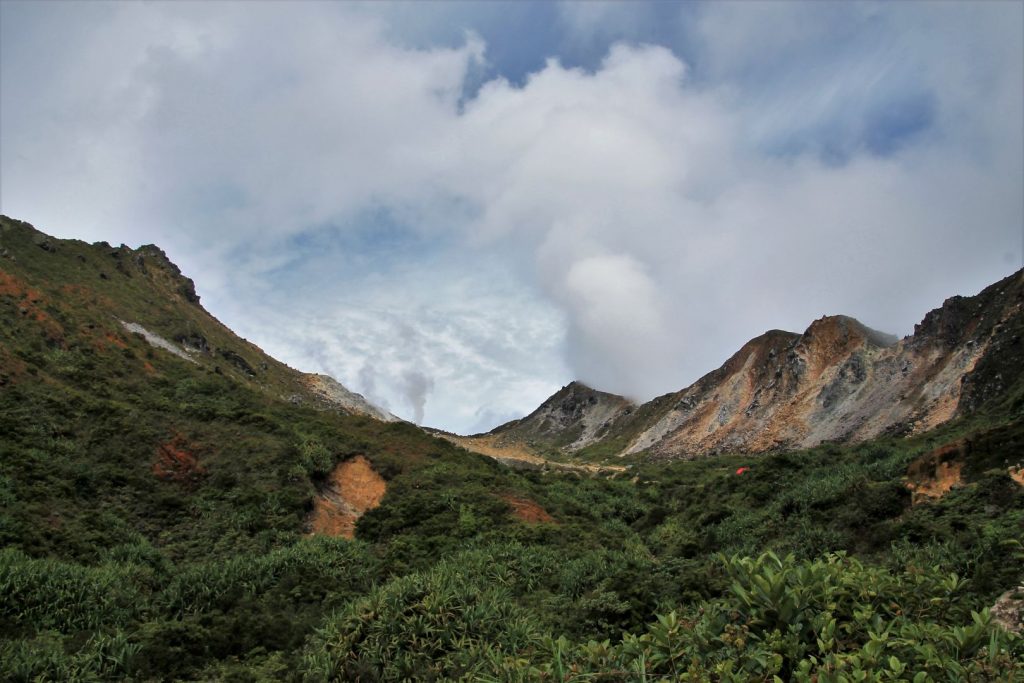
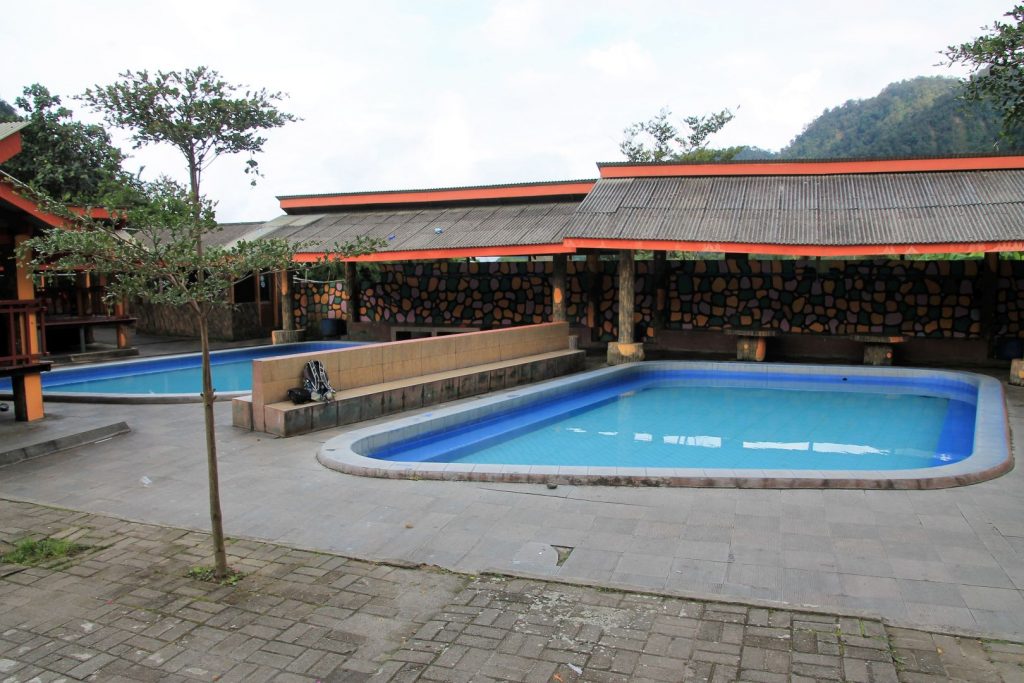
Gundaling Hill
The next day was reserved to go hike up to the Two Colours waterfall. It’s a 17km drive north from Berastagi to the park entrance and from there it is a 3 hours hike. Unfortunately my guide told me there is no chance to go as the falls are closed. The reason was the death of some hikers two years ago who were surprised by water rushing down the river during the wet season. I could hardly give up so easily. So I went to the tourist office but my hopes were disappointed. I heard the same story. I could not find anyone to go with and without a guide I could not hike 3h through the jungle. I would highly likely get lost and never be found again. Like all the people on that sign at the entrance of the volcano hike who got lost, some of them died or were never found.
I decided to go to Gundaling Hill instead. The view at Berastagi and volcano Mount Sinabung from there is great. But apart from that there is nothing to see at the place itself, just a lot of sales booths with souvenirs. But I could see the rain coming and was back at the hotel just before heaven opened its flood gates. I have seen some rain during my travels in the wet season but this afternoon in the mountains was the heaviest I experienced so far. The water came down in rivers and the thunder was sharp and loud as gunshots. My inner self was smiling and I thought how good it was that I was not hiking along the river to the waterfalls today.
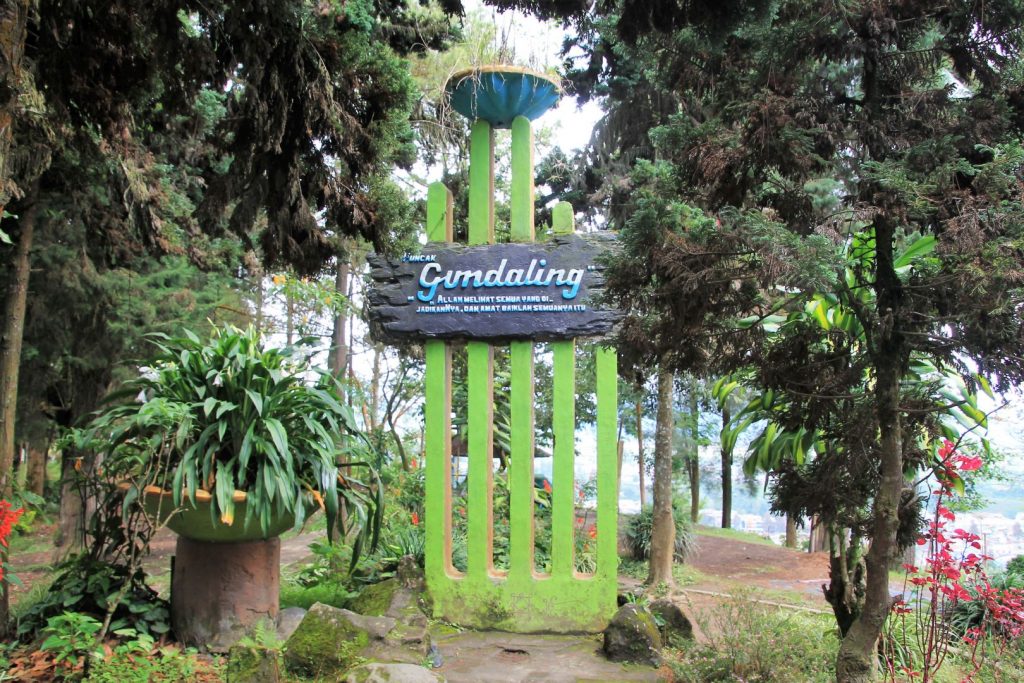
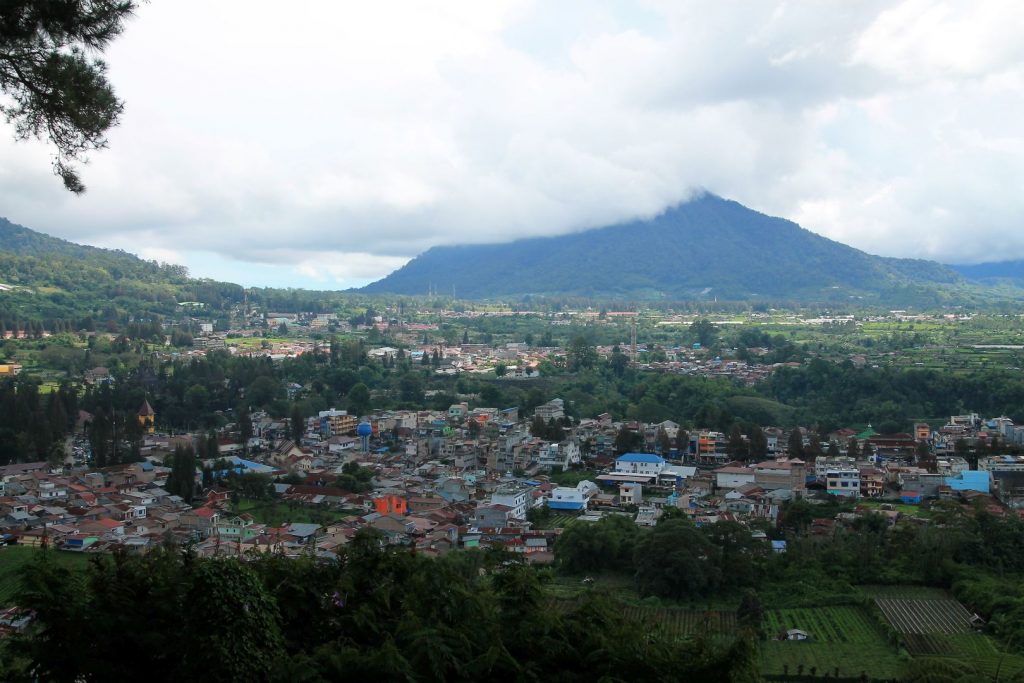
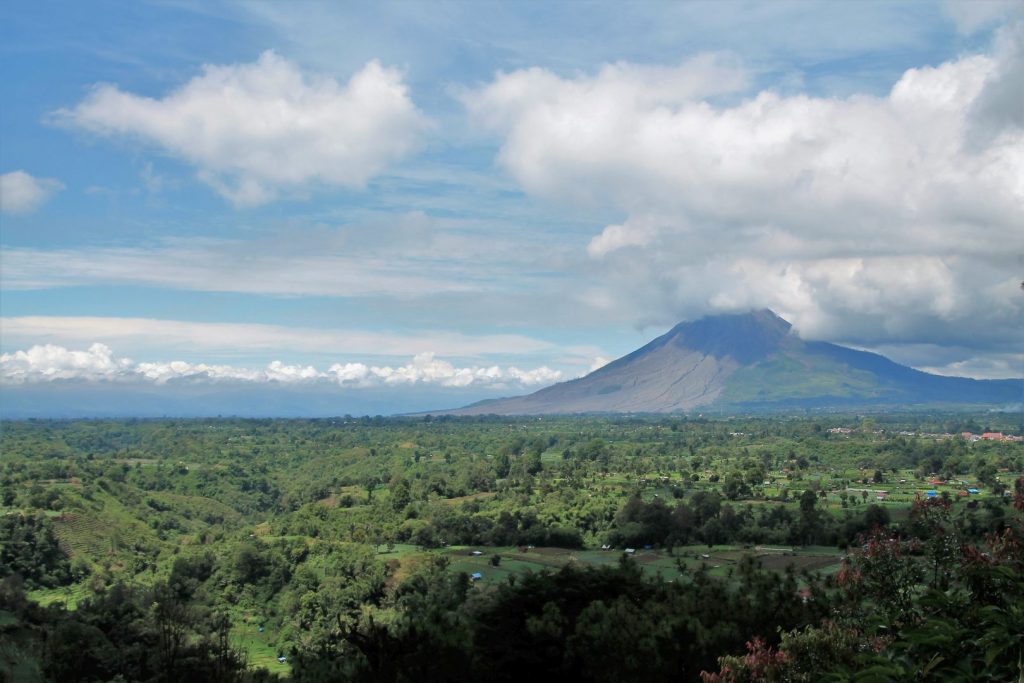
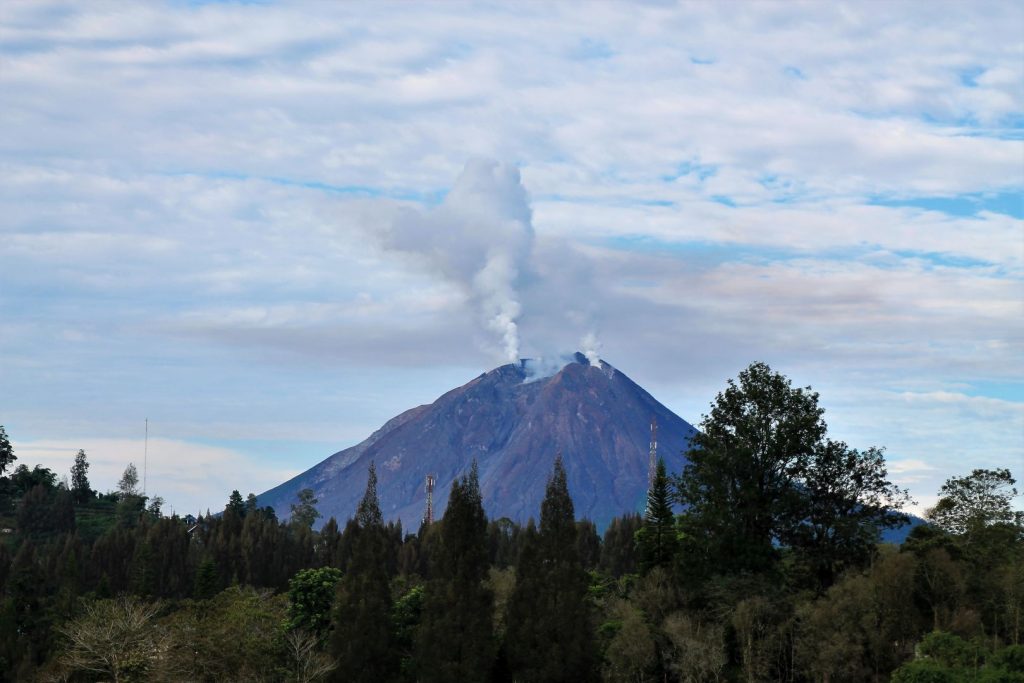
Next morning I took a shared taxi again to the airport to catch my flight to Surabaya, East Java.

